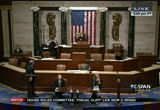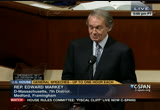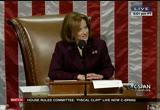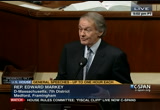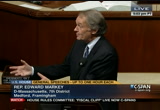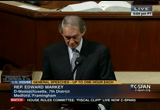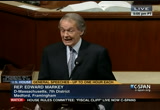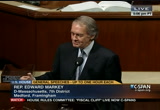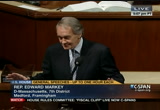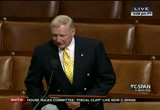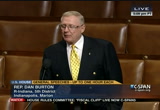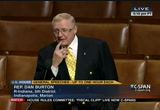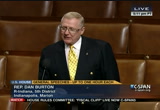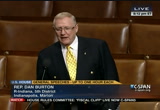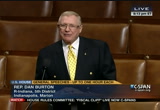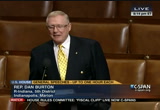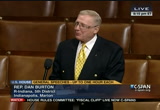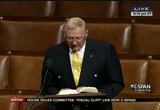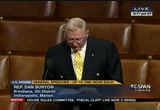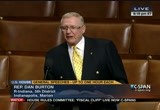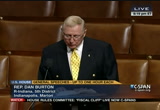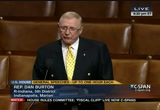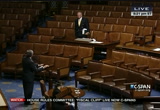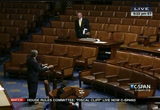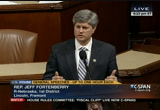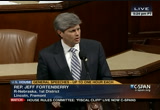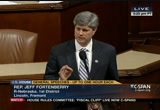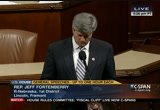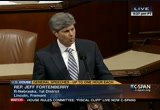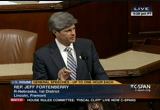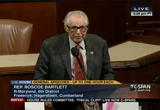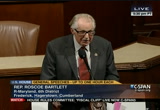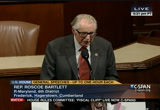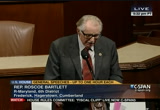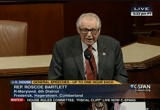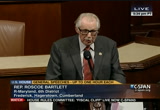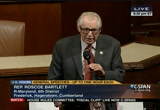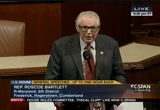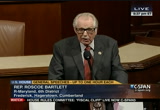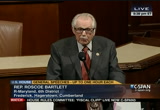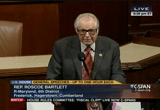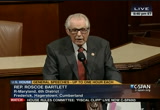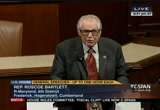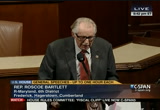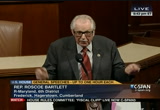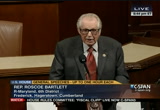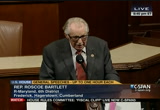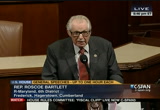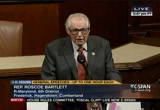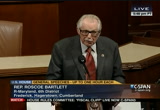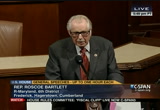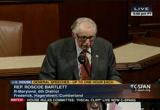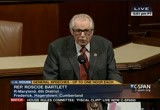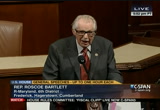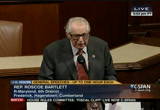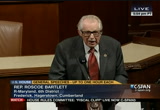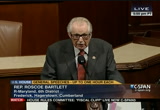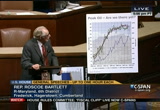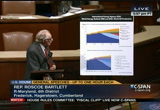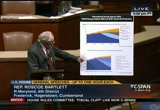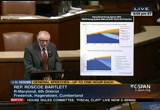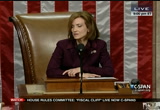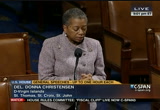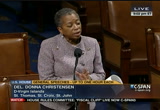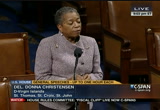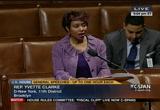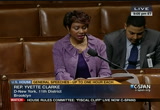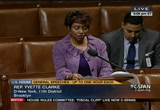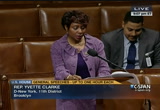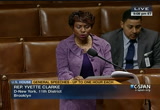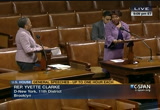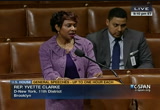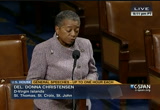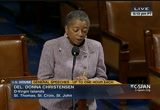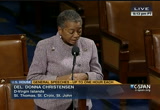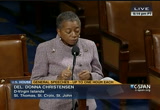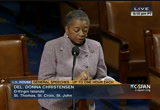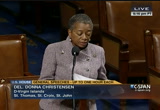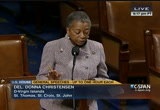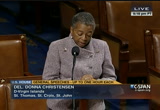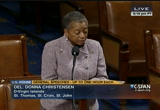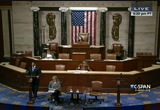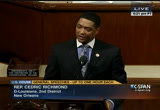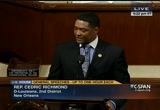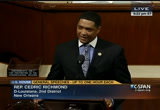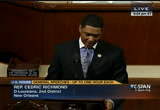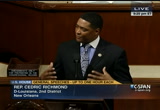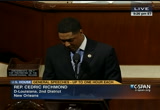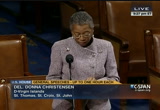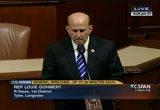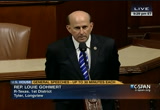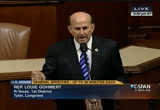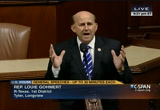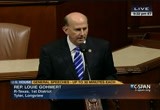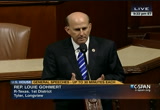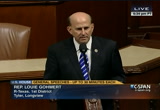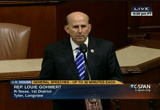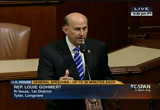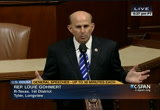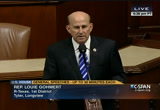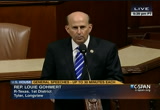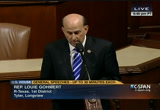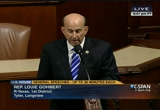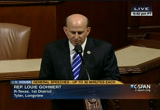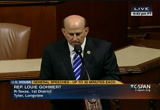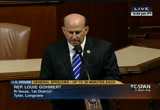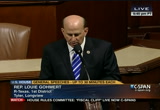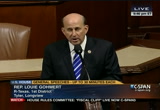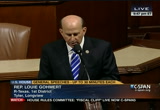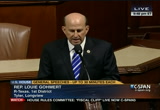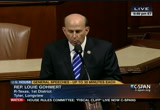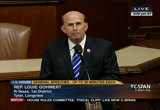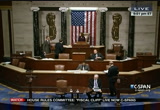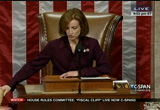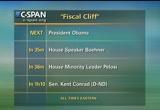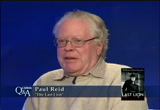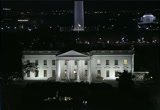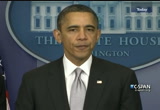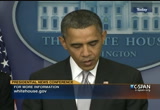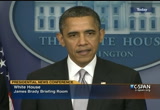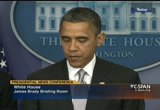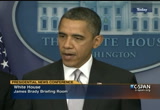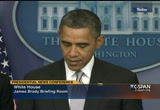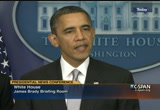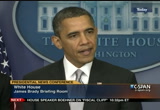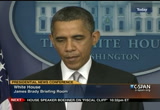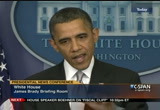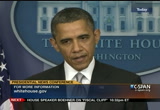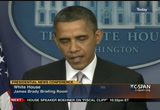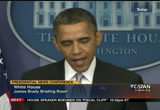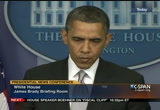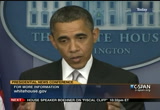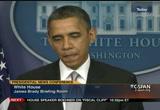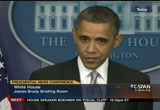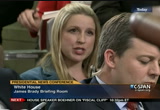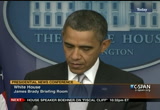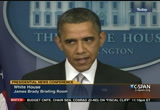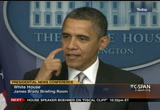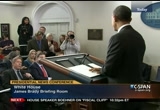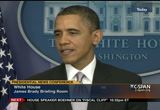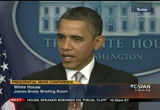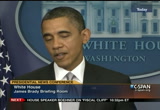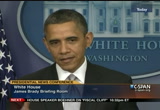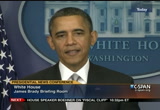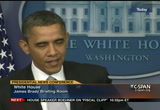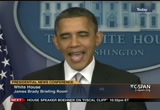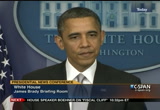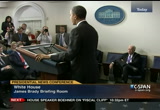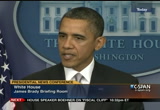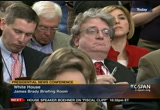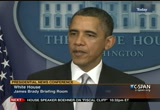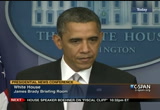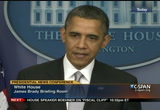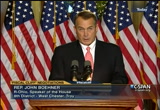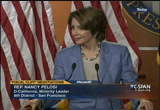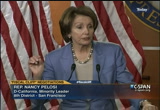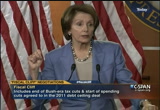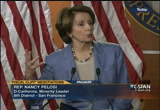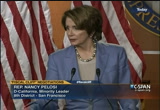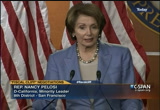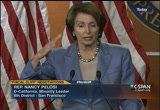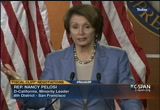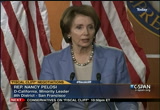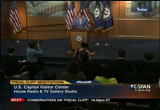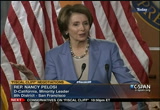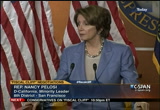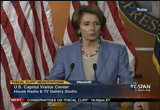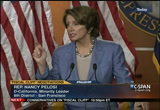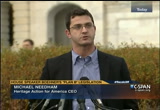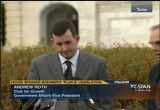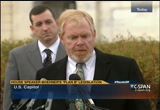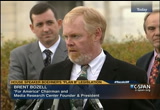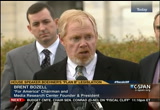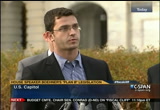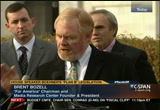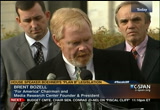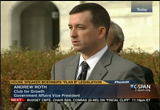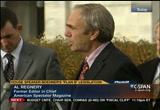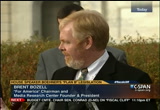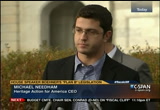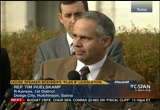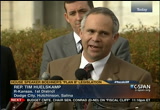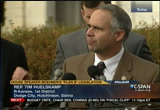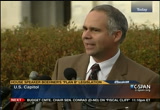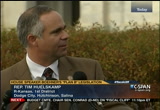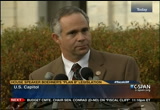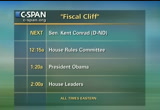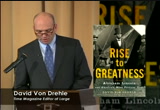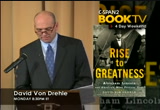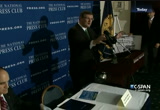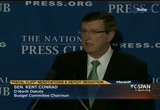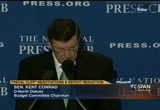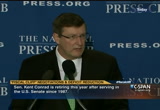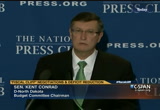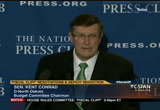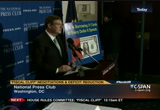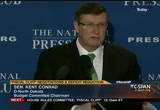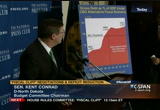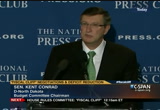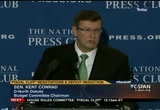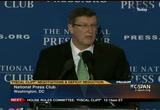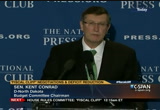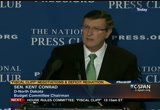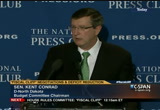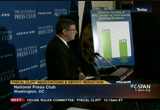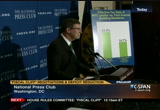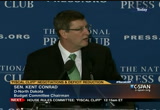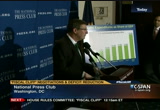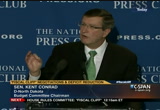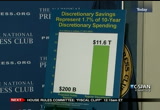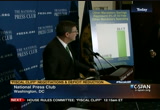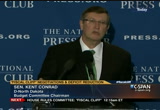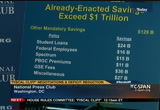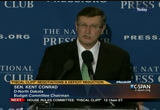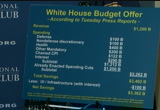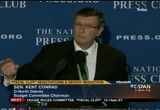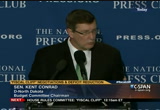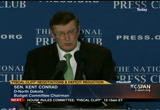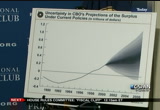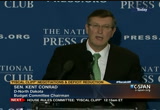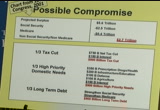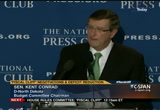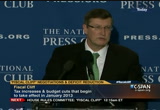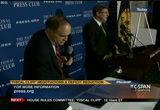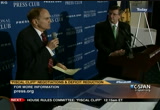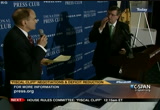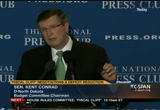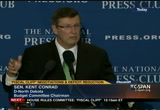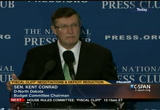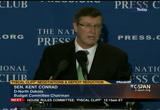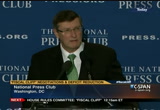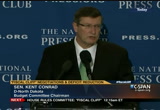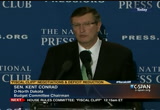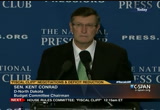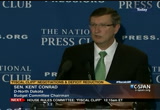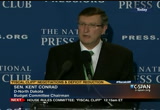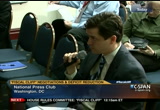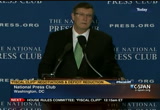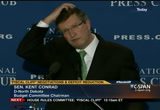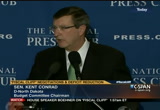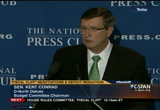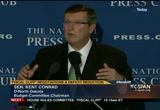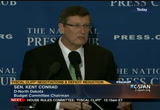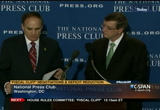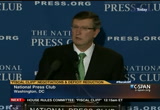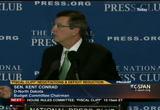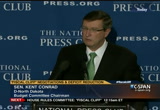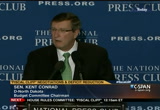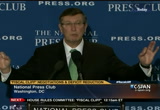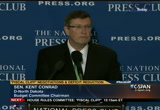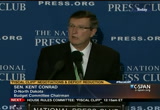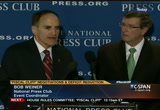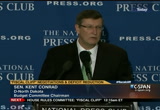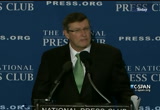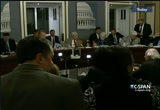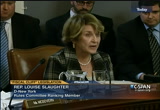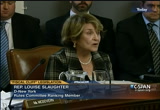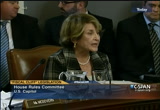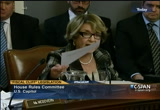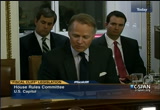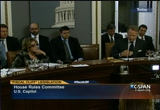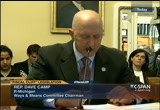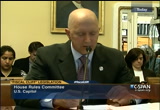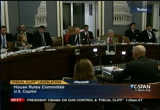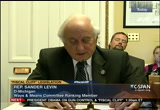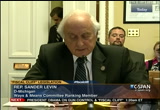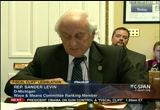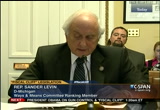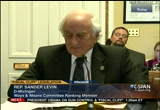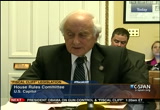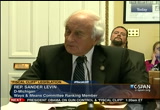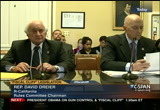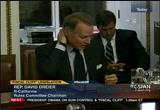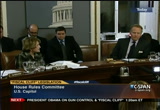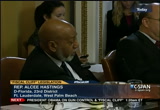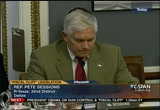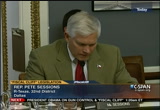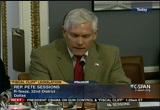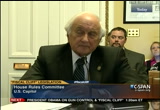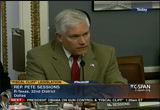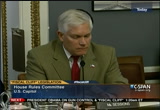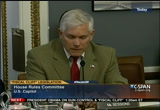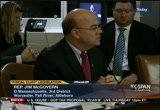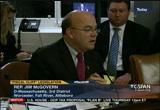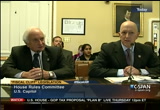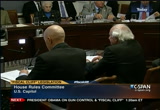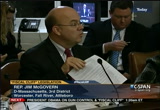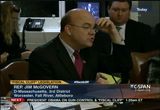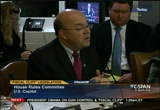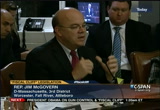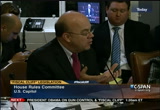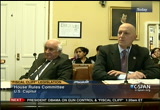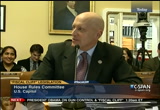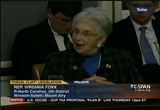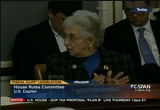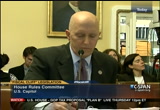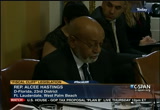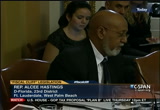tv Capitol Hill Hearings CSPAN December 19, 2012 8:00pm-1:00am EST
8:00 pm
. the gentleman has one minute remaining and -- then mr. burton will be recognized at which point he can yield time. mr. burton: i will do that. thank you. the speaker pro tempore: the gentleman from massachusetts. mr. markey: and if barney frank was down here, none of us would have -- none of this would have happened in terms of the understanding of the parliamentary procedure. he was up there trying to grab an managenary microphone. . john oliver has been for us -- olver, has been for us an invaluable colleague. he taught so much to us. when he sat down with us talking about transportation, he explained our own districts to us as far as what was possible. on climate change, i talked to
8:01 pm
him for about 20 years. he was on this issue in the early 1990's and probably understood it probably even before that. he is that smart. he is that visionary in terms of the issues are essential not just to massachusetts, but to our planet. and it has been migrate honor to have served with you, john and to have called you my friend and colleague overall of these years and we thank you so much for what you have done for us and for the country and thank you. and with that -- the speaker pro tempore: the gentleman's time has expired. under the speaker's announced policy of january 5, 2011, the gentleman from indiana, mr. burton, is recognized as the designee of the majority leader. mr. burton: rather than hang the parliamentarian, i yield five minutes to my colleague from
8:02 pm
massachusetts. mr. markey: now on barney frank, barney frank is at the same time the smartest member and the witnessiest member of the united states congress -- wittiest member. he has a nuclear power plant for a brain. there is nothing that he cannot recall when he needs it here in this legislative process. now, over his career, he is usually right, but too soon for many people to be able to accept. that is how far ahead he was on so many of the issues which we worked on here in the house of representatives. his political philosophy, if you want to negotiate, he wants peace. he would love to negotiate you -- with you. he knows that he will outnishte you, but -- outnegotiate you.
8:03 pm
but if you want political war, he will give you that, too. the truth will ultimately prevail. when he was in the state legislature when i served with him, when we had monumental battles on whether or not to reinstitute the death penalty in massachusetts, whether or not we were going to have a black senate seat in massachusetts, it was barney frank who led the efforts to sustain the veto that would make sure that our state would still be the leader in progressive causes. here in congress, the debate on nato burden sharing, the way barney would frame it is, we hell pped these -- helped these people and it is now late into this century and we cannot take
8:04 pm
any more from the poor people's programs in order to pay for the defense of europe. it was time for europe to pick up their own fair share of the burden. the same thing was true with fighting for fishermen. the same thing was true issue after issue out here on the house floor. dodd frank, which was debated right here on the house floor, the same place where abe lincoln was trying to get the votes to abolish slavery, same seats, barney frank led the effort to create the new financial services constitution for the 21st century, not just in the united states but on the whole planet. and there were some provisions that were so important, that is creating a consumer protection bureau, that they would rather
8:05 pm
have elizabeth warren be a senator than the head of the consumer protection bureau and that is a small part of the toe talt of that -- totality of that bill. he said stand up for what's right, even if you don't win early. he has been a parliamentary and substantive cop on the beat walking around here on the house floor using the microphone as his nightstick in order to make sure that nothing happened here that was wrong, would go uncommented upon so that people would know what should be happening. back in the massachusetts legislature, the early 1970's, mid 1970's, barney started to make amendments on gay rights, discrimination was rampant, but no one was raising the issue across the country. so we started to have votes in the massachusetts legislature.
8:06 pm
barney on the losing side. he knew he would lose early on, but ultimately, those defeats led to the victories which we talk about today. out here on the house floor, barney was the lead opponent of the defense of marriage act. he knew that if he was on the wrong side, he was going to stand up and everyone else knew what the right side would look like. there was one day i was standing right here at this microphone and i was talking about oil subsidies, what i felt were unjustified and i said, giving a subsidy to an oil company recording record profits would be like subsidizing a fish to swim or a bird to fly, you just don't have to do it. i was feeling quite good about myself, and i finished and i just walked over here and barney
8:07 pm
stood up and he came over to me and said, you didn't finish that. i said finish what? he said the whole thing, fish got to swim, birds got to fly, got to love that man until the day i die. and that man is jim and barney is married to him and it's because of his efforts and making it possible to change the culture in our country barney is going to love that man until the day he dice. but it took a lot of courage, it took a lot of foresight to know that day would arrive. and nancy pelosi said it, the mount rushmore of massachusetts congressman tip o'nil, joe
8:08 pm
moakley, barney frank, he is going down in history and we all know it on so many different fronts, he changed the way america thinks. and it's quite a gift that he had, that he gave to the country. so for both of them, it has been just an enormous privilege for all of us to serve with you. and i think everyone on both sides of the aisle know there was greatness in our delegation and that it was an honor, john and barney, to have been able to serve with you. and thank you so much. and i yield back the balance of my time. mr. burton: madam speaker, let me just follow up on what was just said and say that barney frank and i had a lot of differences over the years, but we also found times we could work together and we co-sponsored a bill together one
8:09 pm
time. barney and your colleague, i wish you both the very best and hopefully we will run into each other. let me make a couple of comments to my two colleagues who are going to follow me on this special order who told me if i talked too long they will hit me in the head with a ball bat. i want to say a couple of things. daniel inouye, senator inouye, i never met, but i read in the paper many years ago, the ex ploits of daniel inouye when he was in the military yu young man. his family put in a camp in world war ii and volunteered to go into the military. he became an outstanding member of the military. and in italy, he did -- there were exploits that he performed that won him the congressional
8:10 pm
medal of honor. and you don't get that unless you are an extraordinary human being. he took out an enemy position, a german position when he was hit again and again and again. he lost one of his arms, and he just kept going. and i wish he was still here today. i called him on the phone when i found out about that and i told him i never met him but i wanted to know that members of the house thought he was an extraordinary man and i'm sure he will be missed. i have been here 30 years and i'm retiring at the end of this term. and i thought i ought to have at least have a little bit of a swan song maybe five or 10 minutes and talk to my colleagues about what's happened over the 30 years. when i first came here, i was a very young man and i knew everything. you couldn't tell me anything. and now that i have been here 30 years, i realized i didn't know
8:11 pm
much of anything and i probably know less now than i did then. but there's a couple of things that i would like to comment about and that is we have 435 members in this house and 100 members in the senate and we start working with each other and we work together, but we really don't know much about each other. i don't know much about your background, madam speaker, or my colleagues' background. we work together and we don't know whether we were poor, rich, well educated or uneducated. and we work together. and the thing that really has bothered me is the years gone by, i see things happen to my colleagues for whom i know very little. and it bothers me. one of the leaders on the
8:12 pm
democrat side of the aisle lost his wife a few years ago and it wasn't for several months that i even knew about it. i had a number of colleagues who lost their kids, gone through all kinds of tragedies in their families and many of my colleagues don't know much about it. so we go on and we continue to have conversations and debates that we have and we don't realize that we haven't walked in the other guy's shoes very much. so i thought tonight i would take a minute or two and i'm sure most of my colleagues are outdoing something else but maybe they will have a chance to hear, but whether we are democrats or republicans, liberals or conservatives, we ought to think about the other guy and the other gal, who's working so hard to get their points across and may be going through tragedies that we don't understand or can't even imagine. and we need to think about
8:13 pm
walking in their shoes just a little bit before we are so critical. time goes by so fast. i have been here 30 years and i can remember the first day i walked up with my family to the steps on the capitol, the television camera was following me and i thought this was going to last forever and i thought my kids would be with me forever and my staff and my wife. she passed away 11 years ago and fortunately i have another wonderful wife. but you go through all these tragedies and it goes by so fast, you just don't realize it. and you don't take the time to smell the roses until you are a little bit older and have missed so much. if i was saying something to my colleagues tonight, i would say do your very best and explain yourself the very best that you can and realize that the other guy who has a different point of
8:14 pm
view really believes in what he is doing and ought to be more tolerant and don't criticize him too much unless you have a chance to walk in their shoes. all glory, according to general patton, he said all gory is fleeting and it's true. i see these young guys come in and they are going to change this world overnight. and i try to talk to them in an elderly way, i guess you would say and say have you been around the capitol and looked at all the statues. have you seen some of the pictures around here and they'll say i have seen them. i will say do you know who they are? and they'll say, well, no. i say, they were speakers of the house and presidents, vice presidents of the united states. and you don't know who they are?
8:15 pm
remember this. you think you are going to be remembered. you are going to do your best but a footnote in history. one line. don't take yourself so seriously. do the best you can and fight for the things you believe in and stick for your principles but don't think you are something special, because you are just another congressmen. we have had 12,000 congressmen and senators in our history and you are going to be one of them and it's an honor to be able to be among those, but remember, there were caesars who ruled the world and you don't know who they are. so be more realistic, because all glory is fleeting. i want to read to you something here, couple of poems. first poem is called "bag of tools the." kings, clowns and common people
8:16 pm
like you and me are builders for eternity. each is given a bag of tools, a shapeless mask, a book of rules and each has made a stumbling block or a stepping stone and i hope my colleagues will try to make their lives a stepping stone. and i want to talk to you about a guy who served in this chamber, not in this chamber, but a house member and tell you about him. . . a horseman hails and halts and says, as he shifts his cud and speaks, well, did you hear? tom lincoln's wife today, the devil's luck for poor tom, poor nance, poor youngen born without a chance. a baby in that god for saken den, a worse than cattle pen,
8:17 pm
what are they other than cattle? a critter's beef, high in tallow and b tumbings tt, whode swap one for the critters that have hut? white trash, small fry. only instipulates are to multiply. they're good at that and so today god want another brat. another squawking, squalling, red-faced, good-for-not, better if he was black for then he'd have a shirt upon his back and something in his beli as he grows, maurice like to have. yet there will be those who claim equality for this new brat and that damn democrat who squats today where washington once sat, he's have that lincoln cud might be equal value of you and me. tom jefferson, who even thinks a black man should be free? that feather-headed fool would tell you that maybe a president might lie in this new baby. in this squawker, born without a rag, to hide himself, good god
8:18 pm
it makes me gag. this human spawn, born for the world to wipe its feet upon, a few years hence but now he's more helpless than the litter of a sow and oh, well. send the women folks to see nance. poor little devil. born without a chance. who became one of the greatest presidents we ever had. who passed the emancipation proclamation and made everybody free. but he didn't have a chance. then i want to say to my colleagues one more thing. and then i'll stop. and this is when you speak on the floor and i hope my colleagues will get a chance to read this because it's really important. you drop a pebble in the water, just a splash and it is gone. but there's half a hundred ripples circling on and on and on.
8:19 pm
spreading, spreading from the center, flowing on out to the sea, and there's no way of telling where the end is going to be. drop a pebble in the water and the minute you -- and in a minute you forget, but there's little waves aflowing and there's rippling circling yet and those little waves aflowing to a great big wave have grown. you've disturbed a mighty river just by dropping in a stone. drop an unkind word or careless, in a minute it's gone. but there's half a hundred ripples circling on and on and on. they keep spreading, spreading, spreading, spreading from the center as they go. and there's no way to stop them once you've started them to flow. drop an unkind word or careless in a minute you forget, but there's little waves aflowing and there's rippling circling it and perhaps in some sigh at heart, a mighty wave of tears have stirred. and disturbed a life that was happy, err you dropped that one unkind word.
8:20 pm
drop a word of cheer and kindness, just a flash and it's gone. but there's half a hundred ripples circling on and on and on. bearing hope and joy and comfort on these splashing, dashing waves, until you wouldn't believe the volume, the one kind word you gave. drop a word of cheer and kindness, in a minute you forget. but there's gladness still aswelling and there's joyous circling yet. and you rolled a wave of comfort whose sweet music can be heard over miles and miles of waters just by dropping one kind word. so if i were talking to my colleagues tonight, i'd say that , think about your colleagues and their families and the troubles that they have and the heartache they're feeling and think about the words that you're saying to them and the kind of attitude that you're creating in your colleagues and their families by the things you're saying and fight for the things you believe in but
8:21 pm
remember there's another human being over there who could be helped or hurt just by what you're saying. on the floor of the house of representatives or the united states senate. and with that, madam speaker, i'll yield back the balance of my time. the speaker pro tempore: the gentleman yields back the balance of his time. under the speaker's announced policy of january 5, 2011, the gentleman from nebraska, mr. fortenberry, is recognized for 40 minutes as the designee of the majority leader. mr. fortenberry: thank you, madam speaker. before my colleague, dan burton, leaves the chamber, i just want to say thank you. thank you for your thoughtful reflections here. i should tell the speaker as well as everyone who might be watching that we were teasing you a moment ago because you said you were only going to speak for 10 minutes. i said, dan burton, you've never spoken for 10 minutes in your life. but you held it to about 10. your words were not only precise, but they were deeply thoughtful and meaningful.
8:22 pm
and i think they're an outstanding tribute to you in leaving this body and i want to thank you for your personal friendship to me, for your words of admonish to the rest of us to try to be a little kinder, a little bit gentler. i think it's important for people to know and you alluded to it that over a decade ago your own wife died. the care giver for your wife, she had cancer, was a person, samia, who became your friend, became friends of your family and your own children encouraged you to perhaps pursue a relationship with her. and now she is your lovely wife and it's been a pleasure to see you so happy in these last years of public service. but we really appreciate your dedication and passion to serving this nation. so thank you so much. mr. burton: thank you. mr. fortenberry: madam speaker, i'd like to turn to another topic now. i sat in my office last night
8:23 pm
looking at the pictures of the precious little children who were killed in connecticut last friday. what can you say? my heartbreaks for them and their parents -- my heart breaks for them and their parents and the people of newtown. i looked at the picture of little caroline previdi, one of the 6-year-old children who died. i'm sure she was a happy child, full of life's potential, just like my own little caroline who just turned 7 a few days ago. what can you say? it's unthinkable that a person would kill innocent little children with such cravenness and violence. these children's christmas presents are still under the tree. their moms and dads are still looking at them. in this town, will we pride
8:24 pm
ourselves on rhetorical flourish , precision of thought and volume of words, what can you say? what can you do? other than stand in solidarity, in spirit with the grieving families and perhaps, just perhaps hug those that you love a little bit tighter. now, madam speaker, the sandy hook elementary school tragedy is sparking a national debate about how and why this happened and how it might have been prevented. that debate is understandable and needs to happen. in the coming weeks, congress will be called on to react. questions have already arisen about guns and school safety and emergency preparedness. but these concerns and debates may bypass altogether some of
8:25 pm
the deeper, more difficult issues involved like what we grappled with after the tragic shootings of young people at columbine high school and on the virginia tech campus. what we must do, what we must do is to be honest. yes, there were guns involved, yes there are issues of school safety. and yes there was a collapse of mental health intervention. but i have not heard a significant discussion of the broader cultural context in which this and other tragedies have happened. all of these tragedies happened against a backdrop of a culture that increasingly devalues and degrades human life. graphic acts of violence and inhumanity pervade popular culture, entertainment and other venues that vie for our attention. flipping through the channels
8:26 pm
recently i saw on a law and order d show ironically a man shot in an he will etvater with -- elevator with blood splashing on his attorney. secondeds late we are move on to the next -- seconds late we are move on to the next scene or -- later we move on to the next scene or the next commercial without consequence. we are supposedly entertained by this. and of course the producer gets the profit. but who really pays? society grows increasingly numb to the increasing levels of wanton brutality and cruelty and indignity all celebrated for profit. perhaps most of us can shake it off or just turn it off but what happens when a person of limited stability sees these images over and over again? we preach tomorrow tolerance for
8:27 pm
one another but fill our culture with grotesque and human depictions and expect that there will not be consequences. madam speaker, i'm sure there are any number of ph.d.'s out there who will somehow refute that there is a correlation between this aggressive assault of images before us, constantly before us, and the recurring violence that is all around us. instead we want simple answers and quick fixes and then we'll just move on. i suggest that we look inward, to regain a deeper understanding of what it means to be in community, in a common bond with neighbors where persons are not in isolation, where check mechanisms are so ordinary that persons are not simply roaming around, disconnected from communities of concern, family life, mental health treatment or swift enforcement action, whatever is needed.
8:28 pm
a single and simple policy response from washington cannot fix this. we all want to have a more caring and supportive society but the fragmentation of family, civic and our nation's community life lends itself to isolation, anger and for some even despair. now let's be clear, this tragedy is the result of a deeply disturbed person who committed unspeakable crimes. that is where the blame rests. but perhaps, madam speaker, but perhaps an outcome deserving of these children who died is that we all take some responsibility for the degradation of culture, what we think about, the way we conduct ourselves and perhaps
8:29 pm
strive for that which is noble, that which is good and that which is just. madam speaker, i yield back. the speaker pro tempore: the gentleman yields. under the speaker's announced policy of january 5, 2011, the gentleman from maryland, mr. bartlett, is recognized for 32 minutes as the designee of the majority leader. mr. bartlett: thank you, madam speaker. i would like to echo the concerns of my colleague. we are changed. we are affected by what we see, by what we hear, by what we listen to, by what we watch. you cannot swim in a sea of
8:30 pm
violence and not be affected by it. i know we have a constitution and an amendment which guarantees freedom of speech, but you don't have a right to do what is wrong and it is wrong that our entertainment media is placing before particularly our impressionble young people these unending seas of -- scenes of violence in these video games. you know, whatever the unbridled freedom infringes on another, do you have that right. you have the freedom of speech but you can't yell fire, fire in a crowded theater if there is no fire because people could get hurt in trying to get out. that same philosophy i think would permit us to limit the kinds of entertainment and the violence that pervades our society. . there are many factors
8:31 pm
as to what caused this tragedy, but certainly this could be one of them, particularly to people who don't have all of their faculties the rest of us have in contending with changes in our environment. i would like also to refer back to comments that my good friend, dan burton, made, so little is known about us here. we act like a spontaneous generation and in front of a microphone and people are watching us. i thought i might spend just a moment doing what i should have done 20 years ago and try to introduce myself. i was born in 1926. if you are doing some quick
8:32 pm
math, that means i'm in my 87th year. family hardly knew there was a great depression. we were just as poor before the depression as we were during the depression. i was the first member of my immediate family to graduate from college. i wanted to be a medical missionary and i was studying theology and taking science courses to go to med school and i had a good science teacher and when i graduated from college, i not only had a degree, a major in theology and a major in buyology and minor in chemistry and i decided not to go to medical school and wanted to go into the ministry and i was 21 years old and looked 17 and i wasn't married.
8:33 pm
so they advised me to occupy it and i went to graduate school and i got a master's and a doctorate and committed myself to being a very serious basic researcher. i thought medical school for four years and worked at the national institutes of health. i went through a lot of professional scientific meetings and i have 50 papers in the basic inspecttiveic literature and i went as a basic researcher to the school of aviation medicine in florida. they had some problems that i thought i could solve. i was a farm boy. i have always lived on a farm and you kind of make do and i thought i could fix some of the problems and that resulted in the awards of 19 military patents as a result of fixing some of those problems they had. this started clearing working for 20 years for the military.
8:34 pm
i should mention that i returned to my first love and that was teaching and i thought for another 20 years and also my wife and i ran a home construction business. and it was said roscoe was green before it was cool to be green. i was building solar houses in the 1970's and selling them as much at 17% interest and then i was retired for five years and i ran for congress and i tell you, there is nothing that i have done that has given me the fulfillment and the satisfaction as serving the constituents of the 6th district of maryland. for 20 consecutive elections, 10 primaries and 10 general elections, they returned me to the congress. i want to thank my constituents
8:35 pm
very much for that vote of confidence. and that was really ladgely due to the fact that i drk largely due to the fact that i had a great staff making me look good in spite of my limitations. most of my commitment in the congress has been in the armed services committee. you can have only one chairmanship here. those have been in armed services. i shared leadership of that -- of the -- one of those subcommittees, the one that has responsibility with the navy and marine corps with my good friend gene taylor. i had to leave that subcommittee, but while i was there, gene and i changed the course of our navy for the future. and all of the major surface combatants will be nuclear.
8:36 pm
didn't make any sense to us that our aircraft carriers which are nuclear cannot function without the escort ships who are fueled for about five to seven days and if there are no tankers out there to fuel them, that didn't seem to make any sense to us and we pushed and got it through our navy surface combatants are going to be nuclear. i had responsibility for the marine corps and i was honored to work with gene taylor and 47 $-- $47 billion, saved a lot of lives in the assem metric war. i thought i might spend a few moments that remain and look back at those times i have come to the floor. i came here to talk about four different things and i thought i might spend a few moments
8:37 pm
talking about those things. probably got more calls in our office about the talk i had given here probably four, five times, i called it what made america great. and what it was trying to do is to go back and look at our history and refute two big lies that are out there in our land. one of those is that our founding fathers are usually atheist and wanted to set up a country that was devoid of religion. if you look at our history book, that isn't true. what i did in that talk is go back to our founding fathers and look at those statements. i want back to our early congress and looked at what they did, like buying 20,000 copies of the bible to give out to our early constituents.
8:38 pm
like sending and paying for missionaries to go to the american indians for 100 years. our congress did that. i looked at our supreme court until they made that big decision about three-fourths of the history of our young country, they were supportive of religion. supreme court used the bible and said why shouldn't you use the bibles in our school, where else would you find a clear definition of what is right and what is wrong? and then went to our schools and the mcduffy reader, some of our schools went back to that because some kids couldn't read their own diploma and they looked at what could work. and makes no apology. quoted more often from the bible than any other source. one of the founding fathers was benjamin franklin and some others, like thomas jefferson
8:39 pm
was said to be a deist. someone who believes in god and said in some laws, don't bother praying to him because your destiny will be determined how you relate to those laws. i'm going to give a quote, not an exact quote to what franklin said. let you decide if you think he was a deist or not. it was in philadelphia. the constitutional convention was deadlocked. they might not get a constitution. benjamin franklin was the oldest member of that delegation, probably the most respected, governor of pennsylvania and he wrote this speech. and this is what he said. i'm an old man. i've lived a long time and the longer i live, the more certain i am that god controls in the affairs of man. if a sparrow cannot fall to the
8:40 pm
ground without its notice, can a nation rise without his aid. he went on to say, i move hence forth we begin each of our meetings with prayer. that started a precedent. i know that the 10 commandments are coming down from the halls of the courthouse and the nativity scene is disappearing from the public square, but you can still see it here, in god we trust and we begin each of our meetings here with prayer and they do it in the senate on the other side of this building. what more responses to our office in what america made great and our founding fathers were christians and wanted to set up a christian nation and that first amendment is very simple, you know, they came here, most of our founding fathers came here to escape
8:41 pm
tyranny, tyranny of the church and the tyranny of the crown. if you think about it, they all came from countries that had a king or emperor. if you think about it, they came from countries where there was a state church in england was the episcopal church and a roman church and they oppressed other religions and they didn't want that to happen in their country. they said something very straightforward, make no law respecting the establishment of a religion. the state cannot establish a religion otherwise let men free to worship. i don't know how it got into this idea that you can't be religious. by the way, that clause is in the constitution. the separation of church and state. it's in the constitution of the u.s.s.r. it's not in our constitution.
8:42 pm
second thing i came here to the floor to talk about when the debate was raging was the ethical stem cell procurement. remember when george bush came to office, there was a lot of research in stem cells and we have been using adult stem cells but i'm probably the only member of congress that has a agree in advanced embriology and they thought there ought to be more usefulness in stem cells because they are pretty potent and will develop into anything. and get to adult stem cells that is differentiated and somewhat limited in what you can do with it. get these embryonic stem cells that were destroying the embryo. 40,000 embryos are discarded because they won't pay for
8:43 pm
keeping them. they are frozen and discadded and the argument is you can take one of these discarded embryos and you can crush it and get the stem cells from it. before you do that, you look at it under the microscope and there you see it, living tissue. gee, that might be the next albert einstein. when you are talking about collectively 40,000, it's easy to say, they can be discarded. unique human beings, give it a chance to be implanted and to grow in the womb. but i knew we could get cells from these early embryos. how did i know that? how was i so sure? you can take half the cells from an early embryo and goes on to develop a perfectly good child, infant.
8:44 pm
how do i know that? because the other half of those cells went on to produce another perfectly good twin. and in every case of twins that you see, identical twins that you see, half of the cells were taken from the embryo and the other half went on -- the chairman of the president's commission on ethical embryonic stem cell was an identical twin and i asked him if he felt any less of a person because he was only half a person and only half of the embryonic cell. perfectly silly question, of course. he said that is a silly question. but i said that is what people are saying, if you are going to take a cell or two, somehow it's going to be less of a person when it develops. well, i worked nearly six years with the white house,, council of catholic bishops and developed a bill that was passed unanimously in the senate and failed on a technicality and got
8:45 pm
way more than half the votes and so bush gave it the effect of law because he supported it by making it an executive order and the first executive order this administration and the hand hardly came off the bible when our new president reversed that executive order. had it become law and people asked me what was the greatest disappointment of my 20 years here and that was my bill passed unanimously by the senate and couldn't become law, because you would have to overcome a veto and would not have 2/3 of the votes to do that. . electromagnetic pulse. i had no idea when i first learned about this that -- i called my friend tom clancy because i knew that he had written a book where this was a scenario in his book and he does
8:46 pm
really good research. and so i asked him about it. he said, if you read my book, you know all i know about it. let me refer to the smartest man hired by the u.s. government. that's a tall order because we are hire a lot of people. but in his view that was a dr. lowell wood from lawrence liver moore and this was precell phone day. remember the pagers? and i paged lowell wood. he was in washington and he -- within an hour he was sitting in my office. electromagnetic pulse. we have only one brief experience with it in our country. and that was in 1962 and johnston island, the only time we ever debt nailted a weapon above the atmosphere. we had no idea what would happen. it produced an electromagnetic pulse because a lot of disturbances in hawaii which is about 800 miles away. the soviets had a lot more experience than we. they actually developed -- we
8:47 pm
designed them but never built them, enhanced e.m.p. weapons. a single large nuclear -- i shouldn't say that. because it doesn't have to be a large bomb. because it could be a relatively small bomb that's e.m.p.-enhanced. a single appropriately bomb detonated three miles high over nebraska or iowa would prank et our whole country and -- blanket our whole country and if the e.m.p. lay down was robust enough, it would essentially fry all of our microelectronics. the grid would be down for a year or more. and your car wouldn't run and there have been a couple of books writ on that subject. one i would -- written on that subject. one i have read which is an easy read and i commend newt gingrich, he brought the author to my office and he mentioned this on the campaign trail, thank you, newt, this was a book called "one second after." i came to my office one day and there was a big book on my desk and there was a hand written
8:48 pm
note on it and frfs a dr. lowery. he was a retired ph.d. electrical engineer in his hospital room, recovering from cardiac surgery. and he was surfing the television, he happened on c-span and i was giving one of the half dozen talks that i've given on e.m.p. and he listened to it and got turned on, did a lot of research and wrote a book about, about 700 pages. i didn't think i could read a novel that long. it was so captivating i read it. and it's called "the satan legacy." the satan was a big essay 18, he was one of the soviet missiles with 10 nuclear war heads and the story had one of them missing when they transferred from the ukraine to russia. now we know that several other things could also bring down the grid. oh, by the way, as a result of my work on e.m.p., we now have a permanent e.m.p. task force in the pentagon looking at our preparedness mill tarly --
8:49 pm
militarily. we have an e.m.p. commission which functions for four terms, that is eight years. they have written classified and unclassified reports and i would recommend that you get, whether -- get one of those unclassified reports. there's one things that could bring down the grid also, the other one is cyber. this is a whole new warfare we're in. we hardly knew about it. but there it was raging. an appropriate cyberattack could bring down our grid. and something that will bring down the grid, this is not an if, this is a when, and that's a giant solar storm. the only question is when will the next one come? and we are not prepared for it and we are not now and if we do not prepare for it, it will bring down the grid. the top person in that part of ferc sat in my office and said that the grid would be down for a year and a half to two years. that's a very long time to hold your breath.
8:50 pm
and there's another thing it could bring down and that's a terrorist attack. if you knew what the important substations were and you knew which insulaters to take out, it wouldn't take more than a dozen or so people with a 22 rifle. now why when the grid goes down can't you bring it back up? that's because in all of these instances there's going to be surges of electricity that blow the major transformers. they simply won't melt down. we have a few spares but a very inadequate number of spares. we don't make them in our country. you just order them. there's none available to order by the way. you order one and they will build it for you and it takes a year, a year and half to two years to build one and we don't build them in our country. so i'm pleased that my efforts i started here on the floor talking about e.m.p. have resulted in a recognition that this is something we really need to deal with.
8:51 pm
a fourth thing that i came to the floor to talk about and i will spend the last few minutes of our time here together this evening talking about that, and that is energy. and i've been to the floor i think 52 times and most of those times i came here i talked for a full hour. i was talking about energy. not just energy, generically, but a specific time of area, that is liquid fuels. you're talking about energy, we really do have to separate liquid fuels from the other major carrier of energy, it's not energy, it's what you carry energy, that's electricity. because we shouldn't have any deficit of electricity. with more nuclear power plants. and yes, they are safe. we've never lost a person operating them. with more machines, with more solar, with more microhydro, with more true geothermal. we need another word for these heat pumps that are looking and trying to keep that up to heat
8:52 pm
your house up or trying to heat up hot air to make your house cooler in the summer time. if you're looking at 56 degrees here, that's a whole lot more efficient. we call that geothermal. we need another word for that because true geothermal is tapping into the molten core of the erg. that for all practical purposes is infinite. it will be there for a very long time. but these sources, we can produce all of the electricity that we'd like to produce but that is not true of liquid fuelless. they are finite. one of the first people to recognize that, and he was for several years a pariah and then he became an icon and his name was m. king hubbard. and he gave what i think will be recognized as the most important speech of the last century. that speech was the eighth day of may in 1956. and he gave that speech in san
8:53 pm
antonio, texas. he was an oil geologist and he gave it to a group of oil people. if you look back in your history books you will find that at that time we were king of oil. we produced more oil, we used more oil, we're still doing that, we're using more oil than anybody else. and we sold more oil than -- exported more oil than any other country in the world. and m. king hubbard told them something that was just adashese and seeminglyry dick -- you a darbes and seemingly ridiculous. he said, notwithstanding the fact that we are so big in oil today, in just 14 years the united states will reach its maximum oil production and no matter what do you after that, oil production in the united states will go down. how could he make that kind of a prescription? -- prediction? he made it because when you looked at an individual oil field, he saw that the exploitation of that field produced kind of a bell curve. is sometimes a little distorted bell curve. but kind of a bell curve. when you first starded pumping
8:54 pm
it really came out. then you reached a peak and it was harder and harder to get it out and then finally it tailed off and you'd gotten all you could. so he rationalized that if he could add up all the little seals in the united states, he could get big bell curve and when he did that it reached its maximum of in 1970. so he made that prediction in 1956. right on schedule, 1970, we reached our maximum oil production and no matter what we've done since then, like drilling more oil wells in all of the rest of the world put together, for instance, today we produce about half the oil we produced in 1956. the second speech, and do i don't know if these two men even knew each other, was given by hyman rickover. it was in 1957. it was a speech given in st. paul, minnesota. and you could pull this one up. it was lost until a few years ago. just google for rickover energy
8:55 pm
speech and it will come up. i think that you will agree with me that it was probably the most insightful speech of the last century. and in it he noted that oil is finite. he said in the 8,000-year -- i didn't think it was that long, he said in the 8,000-year recorded history of man, the age of oil will be but a blip. we're behaving as if it's going to be forever. he called it the golden age. please, please, google for rickover energy speech and pull it up. i think you'll be fascinated by the speech. one of the things he said and how long it lasts is important in only one regard. the longer it lasts, the more time we have to plan an orderly transition to other sources of energy. that's not quite what we're doing. and i'm not sure that he would agree that drill, baby, drill is an orderly transition to other sources of energy. i have just two charts of the
8:56 pm
probably 100 or more charts that i use from time to time in talking about this subject and the subject is peak oil. let me show you these two charts. this is the chart from -- that ends at 2008 and it has the oil production as followed by the two major entities in the world that have the most credibility in this. the ei -- e.i.a., the energy information administration and the international energy association which is a creature of the oecd and europe. and these were their two curves. and you see they're leveling out up there. and the headline they put was peak oil, are we there yet? and want to show you one other chart. and you cannot find these curves
8:57 pm
anymore. they were kind of disquieting and they were taken down interest the website. these are the curves that the -- put up by the international energy association. here we're following the production, you can go way, way back for 100 years, producing every time we needed more, we could produce more oil. oh, the different colors here, natural gas, liquids on top, they have that growing. nonconventional oil, that's like from the oil shales, that is growing. that will grow. the dark red there is -- really should be a part of the blue down here. it's enhanced oil recovery, squeezing a little more out of the fields we're pumping from, like putting live steam down there and co-2 and so forth to force it out. these are the fields we're now pumping. they are admitting that we are reaching peak oil plateau here because they have been tailing off. now this chart was done in 2008. and the one below it was done in
8:58 pm
2010. we'll come to that in just a moment. in order to keep the total liquids going up, you notice what they've done is projected two huge fields here. by 2030 they said, fully 1/4 of all the liquids we're getting, only 1/4 of it will come from the fields. 3/4 of it will come from something else. and half of that, half of the total is going to be from fields we're not getting anything from now. that's a pretty tall order. then in 2010 they did this other curve down here and they've reversed the two on top here in different colors but they're the same thing. and they've included the dark red here down with the oil fields that we're now pumping. and this goes to 35. oh, up here by the way they were going to peak at 112 million barrels a day. we're now at -- we've been stuck right here, here we're stuck, 84 million barrels a day for five years. they have it going up to 112
8:59 pm
million. two years later reality is setting in. now it goes up to only 96 million. and they go up five years further to 2035. notice the precipitous drop-off in the fields that we're now pumping. now we have some irrational exuberance in our country about our ability to get some additional gas and oil out of things like the marcellus shails and the fields out in the west. by horizontal drilling and fracking. and what we're doing, these are represented in these two curves here. i think that one can say in analyzing history, with considerable confidence, that these two will not occur. we have in our country now, because we have this additional -- by the way, it's 600,000, that sounds like a lot, doesn't it? 600,000 barrels. we use 84 million barrels a day. and in 11 or 12 days we use, we,
9:00 pm
the world, uses a billion barrels of oil. so we're getting 600,000 from the balkan oil fields out in the west. that's almost literally a drop in the bucket, isn't it? i would just like to close this last chance probably that i have to comment and chat with you here on the floor, it's been a huge honor to represent 660,000 people in the first district of maryland who come here to the congress to talk to have people listening to us out there. thank you, constituents, for this honor. thank you for listening and i yield back. the speaker pro tempore: the gentleman's time has expire. under the speaker's announced spoil of january 5 20, 11, the speaker recognizes the -- the chair recognizes the gentlewoman from the virgin islands, mrs. christensen, for 30 minutes.
9:01 pm
the speaker pro tempore: the gentlewoman may proceed. mrs. christensen: thank you, madam speaker. i'd also like to thank the democratic leader and leadership for giving us the opportunity to come to the floor as the congressional black caucus. perhaps other members may be joining us but we wanted to just add our word of sympathy and condolences to the families in newtown, connecticut. we will all grieve for a very, very long time, and rightly so, the loss of 20 innocent children and seven adults who
9:02 pm
lost their lives in an utterly senseless and horrific act of violence. the people of the virgin islands like the rest of our nation and indeed the world mourn the loss of the 27 people gun down in newtown, connecticut, last week. our thoughts and prayers are with their families and the entire town and they will continue to be for a very long time. our hearts especially go out to those in what we know will be an extremely difficult christmas season. the president and other remind us that we have been here far too many times, even in just this year, as he said at the excue then call service a few evenings ago. it's time to act. it's not enough to sympathize with the families who lost loved ones, we have to take action to protect our children and all our citizens. to that extent, i have signed to the large capacity ammunition device act sponsored by congresswomen mccarthy and
9:03 pm
degette, which would prohibit the transfer or import of large capacity ammunition feeding devices manufactured before the date of enactment, as well as four or five other bills sponsored by congresswomen maloney and mccarthy, congressman perlmutter an others, to improve background checks, to slow the trafficing of guns and chemothem out of the hands of individuals who should not have them as well as the promise act, which is a prevention bill. but i'm ginned this evening by congresswoman yvette clarke of new york who has long been an advocate for ending the gun violence in our communities and providing the kinds of assistance, both intervention and prevention, that we need in so many communities around this country. she's been a leader of so many issues. i'd like to yield her such time
9:04 pm
as she might consume. ms. clarke: i thank my colleague for yielding. madam speaker, i've joined my colleague, dr. donna christensen, representative of the virgin islands here tonight new york remembrance of the 20 -- 20 first grade children and six educators who were mercilessly gunned down last friday at the sandy hook elementary school. innocent victims of senseless gun violence. to the families, educators and community of newtown, connecticut, on behalf of the people of the 11th congressional district of brooklyn, new york, i wish to express my most profound and deepest condolences. i believe like so many across this nation that the families of these victims, the families of children in every community in the united states have some very important questions for
9:05 pm
members of congress. i also believe that as their representatives, we have an obligation to provide them with answers. question why. why have we allowed our communities around this nation from the supermarkets -- from the supermarket in tucson, arizona, to a movie theater in aurora, colorado, a shopping mall in oregon, an elementary school in newtown, connecticut, to the streets of brooklyn, new york, why have we been so reluctant in protecting them? why have we let them -- left them unprotected, vulnerable to gun violence, death, and the terror that such actions inflict. who will speak for the people whose lives were cut short,
9:06 pm
struck down, maimed and traumatized for life? when will we realize that these incidents are not inevitable that we have the ability to prevent gun violence and an obligation to do everything in our power to make gun violence a thing of the past. the answer to these questions will define this generation of members of congress, our answers will determine the future of our civil society. americans have the right to demand answers from this congress. we have the authority to keep the guns away from the streets of our cities and towns. in the 11th congressional district which i represent in new york city, the new york city police department reported 274 victims from 226 incidents
9:07 pm
involving gun violence. and that was in two neighborhoods in the district that i represent. the majority of these crimes were registered in just two communities. 274 victims from 226 incidents. now, fortunately, not everyone perished in these incidents, but one incident leads to many and the repercussions and trauma to those who witnessed these incidents who dooged a bullet in our community, is immeasurable. we have the authority to focus our efforts on penalties for gun trafficking and unlawful sales of firearms.
9:08 pm
we have the authority to prevent the retail sale of assault weapons and high capacity magazines or clips designed for military combat use and we have the ability to register handguns and microstamp munitions to trace ownership and origin. we have the authority. we only need to have the courage to act. the newtown tragedy has highlighted a vexing issue that we as americans must address. it is imperative that we set aside our differences in the 113th congress to pass legislation that will increase accountability among gun vendors and owners, support local law enforcement to stem the tide of gun trafficking across our nation, reduce the number of illegal guns on our street and remove access to
9:09 pm
high powered militarized weapons and ammunition which have no place in our community. madam speaker, this is not a republican problem, it is not a democrat problem. this is an american problem. and this is a problem we must have the courage to address. i want to thank my colleagues for -- i want to thank my colleague for yielding. as i drove up to the capitol for this special order this evening, i reflected on the flags waving half-mast over the capitol. an indication of the deep grief and sorrow that our nation faces at this time. i think to my own community where i've attended far too many funerals of families that have now been devastated by the
9:10 pm
heinous act of gun violence and i think about a former colleague of mine, as a member of the new york city council, i unfortunately count myself among the victims who witnessed my own city council colleague being gunned down before us. so what we need to suns that while these incidents may seem remote for many families, the implications of what can happen in our communities extends beyond what we may hear in the news but affects tens of thousands who may not have been the immediate or intended target of gun violence but have been a witness, have been family members, community members, that have a love and
9:11 pm
care for the loved ones taken senselessly and needlessly. let us muster up the courage to act. and i yield back the balance of my time. mrs. christensen: thank you, congresswoman clarke for joining us, thank you for your leadership and thank you for the words you have uttered on behalf of our communities and the community of newtown and children and our citizens across this country. flags are flying at half-mast across this country, i know whenever i was driving home last weekend and i would see them, our thoughts and our hearts when out to the people of newtown because we knew that that was why they were that way. like my colleague, i recall going to funerals with my children, something i never had to do. funerals of their friends. in his column a few days ago,
9:12 pm
nicholas kosoff quoted nicholas hemingway, a public health specialist, who said children 5 to 14 in america are 13 times more likely to be murdered with guns as children in other industrialized countries. that ought to be a cull to action to all of us he wrote, and i agree, let's treat firearms rationally as the center of a public health crisis. a public health crisis that claims one life every 20 minutes. if only for the sake of our children, we have to act and it needs to begin with renewing the ban on assault weapons. the homicide rate in the united states is 6.9 points higher than the rates in 22 other populous, high-income countries combined this gives me great pause when i think that the
9:13 pm
homicide rate in puerto rico is four times higher than that of the u.s. and the virgin islands is even higher than that. the last report in puerto rico is 36.to per 100,000 and the virgin islands is closer to 60. we have been pleading for more federal help, we can begin with passing the assault ban next year and the other related bills. the united states has the highest rate of gun ownership in the world, an average of 88 per 100 people. i understand the next highest is yemen, somewhere around 56 per 100 people. but the rate of gun ownership doesn't always directly relate to the number of homicides. honduras, wo w the most homicides per firearm has only 6. firearms per 100 people compared to our 88. while finland, which has a relatively high one, 45.3 give
9:14 pm
ups per 100 people only reports about 19 per 100,000 homicides by firearm. so while we must do what is required to reduce guns in our community, assault weapons in particular, in this country, there's much more work that has to be done. as attorney general holder said earlier this week, and i'm quoting him here, as a nation, i think we have to ask ourselves some hard questions. we need to discuss who we are as a nation, talk about the free toms we have, the rights that we have and how those might be used in a a responsible way, end of quote and i recently wrote to my fellow virgin islandsers, as we looked at ours being one of the highest homicide rates in the nation, i also think we need to go further to examine what we have been doing or what we have not been doing in our territory and across our nation that has created an atmosphere where gun violence is escalating to a
9:15 pm
frightening and totally unacceptable level and where in many districts gun violence as -- in my district, has turned against law enforcement. six officers have been injured by gunfire this year. one difed his injuries. communities across this country are experiencing the same thing. i know that many feel that guns are needed for their and their family's protection but keeping a firearm, reports show that keeping a firearm in a home increases the risk of homicide by a factor of three. and guns are more likely to raise the risk of injury than confer protection. the killings in newtown and aurora and other places, horrific mass killings, made by disturbed people, we immediate to pind a way to prevent them from getting access to any firearms. gun violence is happening every
9:16 pm
week in neighborhoods across our country and these, too, demand our attention including gang-related gun violence. gang violence is a growing epidemic across this country. congress has to work toward passing and funding legislation like the youth promise act which helps communities facing the greatest youth gang and crime challenges to help those communities to develop a comprehensive response to youth violence through a coordinated prevention and intervention response. . to go back to the united states, data compiled by the united nations office on drugs and crime, americans are living with greater risk than residents of other developed countries. from 2007 to 2009, the u.s. average 10,987 homicides per year by firearm compared with an
9:17 pm
average of 182 in germany. 10,000 987 compared with an average of 182 in germany, 75 in spain and 47 in the united kingdom. mexico, their average about 5,980 annual homicides, still half of ours by firearms during that same period. colombia was higher. an executive director of the chicago crime lab has said that this is an outliar and lethal violence. other countries have similar rates of rape and battery but said because so much american violence includes guns, includes guns, the rate of death of so much higher. steady gun violence leads especially, young blacks and
9:18 pm
latino men are likely to die in a shooting. each year from 2006 to 2010, homicide is the leading cause of death for african-american males from ages 15 to 24 more than the next nine causes of death combined according to the ces for disease control and prevention. gun violence is part of a complex cycle born of poverty and residential segregation as is poor health and substandard education, which all are related to the poverty and the persistent gun violence. challenges that the nation has yet to truly face and address. and guns are readily available. gun violence thrives in part because exposure to violence makes children likely to engage
9:19 pm
in violence and makes them difficult to learn and climb the economic ladder. we can make a big difference. to make that difference, we have to have the political will. we have to be able to stand up to the n.r.a., which has been silent in the face of this tragedy and other organizations that have blocked us from doing what we know in our hearts is the right thing to do. it is our responsibility as congresswoman clarke said to do what we must to protect our children and our other citizens. president obama has set up a task force, which will be headed by vice president joe biden. he is calling on us to ban military-style assault weapons to ensure that background checks are there for all gun purchases and to make access to mental health services at least as easy
9:20 pm
as to -- as it is to access guns. i would hope we would not seen the partisanship that we are seeing right now in the so-called fiscal cliff issue and that we will work with our vice president and president to truly memorialize the children that are being laid to rest this week and not have them be martyrs to our inaction. i would love to yield to our congressman from louisiana and i'm sure that he will add a lot to this discussion. i talked about the fact that african american and latino males have high rates of deaths due to gun violence and one report goes back to 2004.
9:21 pm
i'll yield such time as he might consume to the gentleman from louisiana, representative richmond. mr. richmond: i thank the gentlelady for yielding and commend her on her passion as a physician and someone who has taken an oath to preserve life and to make sure that people can live out their years in a meaningful way and die of natural causes. i'm from louisiana, which our motto is we're the supportman's paradise. we like to fish and hunt. we like to have a fishing pole and a gun. the guns we use and the guns that sportsmen use are rifles and you don't need high-capacity magazines in order to hunt deer, in order to hunt dove, duck, rabbit. you just don't do that. but i rise tonight in support of my colleagues, because
9:22 pm
especially in our urban cities, we are losing far too many of our children, fathers, mothers, sisters and brothers to gun violence. and every once in a while we will have an event that will shake the confidence of our country and make us take a step back and actually look at our gun laws in this country and say wait, we have done far too much and we have spended the second amendment too far. the founders of the constitution when the second amendment was crafted had no idea that we would have ak-47's with clips that could hold 50 rounds. i can tell you about an incident in louisiana about six months ago where a gentleman was denied benefits at an office and decided he was going to go back inside and one of those good sam tans, an older lady said there is a man arm ouring up in his
9:23 pm
car. state police and our sheriffs responded to it and found the man in his car. he had more ammunition in his trunk than state police and our sheriffs put together. he had an ak-47 and another rifle and so much ammunition. but the scary part to this story and why the good sam tan was key, when they arrested him, he had a suicide note in his trailer. he had every intention to kill as many people as he could even if it meant him dying. when the thugs and criminals have more guns and more ammunition than our first responders, then we have a problem. in our cities when the kids have better access to guns than textbooks, we are a country that went wrong. we aren't talking about every american's right to bear arms, that's in our constitution and i believe in it.
9:24 pm
when we talk about assault weapons, we are talking about about weapons of mass destruction. if you look at newttown and aurora, these aren't incidents where one or two people lose their life. if we tallied the number of people in the united states that died because of gun violence, if another country entered our soil and did that to us, we would declare war and find those people responsible. here in the united states, we have taken the second amendment to protect these that are just indefensible. so i will join with my colleagues and i will say when i was in the louisiana state legislature, i offered an assault weapons ban, a bill to close the gun show loopholes, to have a gun registry and i'm not suggesting here today that we do everything i did in the state legislature because some things
9:25 pm
went very, very far. but what i'm challenging america to do and that's to challenge the n.r.a., the liberals, the gun control lobby, we should all come together in the name of the citizens of the united states and have an adult conversation about can we do better, because we can. we don't need clips that allow people to take out a whole neighborhood. we don't need guns that you can shoot through police vests and hit their bodies sold in our sporting good stores in this country. so at some point, we have to come together. we just can't come together and pray and mourn. people are tired of mourning and people are not fed up, but people are giving up on prayer when you see incidents when you have to bury your children.
9:26 pm
when you drop off your child and expect to pick them up and talk about what they learned today and do they need help with their homework, you never, never imagine you are going to go there and find your child deceased with multiple gunshot wounds because of assault rifles with high-capacity clips. so i will close and thank my colleagues. but we are the united states of america, always in search of a more perfect union. we have to do better and i will close with my own little phrase from a song and toes to the members of congress -- and it's to the members of congress and we had an incident that shed light on this earlier in our term in which our colleague was a victim of gun violence. we should be careful of what we do, because the life we save may be our own. and with that, madam speaker, i will yield the remaining of my
9:27 pm
time to the gentlelady from the virgin islands. mrs. christensen: i thank you, congressman richmond and the two of us have been here on behalf of the congressional black caucus to add our voices to those across our nation who are mourning the loss of those who were killed last week in newtown. and the gentleman said more access to guns than books and it's really true. there is more access to guns than to school books or computers. more access to guns than to decent housing. more access to guns than a decent job. more access to guns than quality health care. colleagues on both sides of the aisle, we need to act and act in the name of those beautiful first graders and all of those across this country that have been lost to gun violence over
9:28 pm
the years. and i hope that we will take that kind of action. with that, madam speaker, i yield back the balance of our time. the speaker pro tempore: the gentlewoman yields. under the speaker's announced policy of january 5, 2011, the chair recognizes the gentleman from texas, mr. gohmert, for 30 minutes. mr. gohmert: first, i think it's important to continue to let the people of connecticut who have suffered so and lost loved ones, they will continue to be in our thoughts and prayers.
9:29 pm
that is such a difficult time and they need our support. it is a difficult time. i think so often when we look for wisdom, different places, solomon should have known, fear the lord is the beginning of wisdom. in the early days of our country , people sought wisdom through prayer. the constitutional convention when they could not reach an agreement after nearly five weeks, ben franklin stood up and
9:30 pm
the contentiousness stopped and someone wrote that george washington looked like he had a relieved look on his face. 80-year-old ben franklin, overweight, gout, arthritis, had problems getting up and down sometimes, but his mind was still brilliant and that's when he pointed out that he had not once thought of applying to the father of lights to illuminate. we have his speech because he recorded it and wrote it in his own handwriting and madison was talking notes but we have franklin's speech and it has provided such solace to me.
9:31 pm
he pointed out he pointed out to his friends that there were time, everyone could remember, back in the revolution, they asked god for specific things and god answered their prayers. and he said these words. he said, our prayers were heard and they were graciously answered. if a sparrow cannot fall to the ground without his notice, is it possible an empire could rise without his aid? we've been assured so in the sacred writing that unless the lord build a house, they will labor in vain that build it and he went on to say, i also firmly believe, without his concurring aid, we shall succeed in our political build nothing better than the builders of babel. we'll be confounded by our
9:32 pm
local, partial interests and we shall ourselves become a byword down through the ages and he made a motion that just as they had during the revolution work the continental congress, that this constitutional convention congress should begin every day with prayer. so he made the motion and there was great discussion but unlike the revolutionary days, they didn't have money, this was a constitutional convention that had just convened. these people came together to write a constitution. they didn't have money, as a body. they had no chaplain, couldn't afford to hire a chaplain and they figured that only with an independent chaplain they could agree on could they have somebody come in and lead each day in prayer as they had in the revolution system of that was put off until they could hire a chaplain which happened as soon as we became a nation
9:33 pm
and the constitution was ratified. but randolph from virginia followed up ben franklin's motion a-- say, we don't have money to hire a chaplain but one thing we can do, here we are at the end of june, 1787, we're about to celebrate our country's birthday again, our anniversary, so why don't we just agree to all go to church together, listen to the same pastor, hear the same sermon, worship god all together as a constitutional convention and they all went to the reform calvinistic church, pastor apparently did an excellent job because when they came back there was a new spirit. they had their disagreements but there was a spirit of cooperation. and i heard some of the comments of my friends earlier across the aisle and i know their hearts, i know donna
9:34 pm
christensen has been extremely gracious to me personally, good people. good people. the best of intentions. i think the world of joe lieberman, was visiting with him sunday morning. his idea is to have a commission to come together and not just jump quickly to some politically correct solution. let's do the right thing by america. not a knee jerk which like the assault weapon ban did nothing. in fact, columbine occurred in the middle of the assault weapon ban, so-called. every gun is an assault weapon. the machetes in uganda, or i'm sorry, rwanda, the worst genocide that we know of in human history. 800,000 or so, with a ma --
9:35 pm
with machetes. of course we know during world war ii, the genocide wasn't just 800,000, it was millions. six million jews, killed by all kinds of means. so we need to be smart about the way we deal with this issue of mass murders and violence in our society. everything should be on the table. and as we continue to remember the loved ones of those who were victims of the tragedy at newtown, connecticut, things go on here in this town. this body, we've been alerted tomorrow, will vote on what's being called plan b. plan a was to try to reach an agreement with the president.
9:36 pm
but from my experience as an attorney, i've negotiated small deals, multimillion dollar deals, i have certified -- i was district judge, chief justice, certified mediator, i don't know if there's anybody else in the congressional body that's been through the training and process of becoming an international arbitrator. and a lot of experience in negotiating. from all sides. when you see speaker boehner go beyond what anybody i'm aware of in our conference really wanted him to do initially, when he said ok, we'll come up with $800 billion of revenue, mr. president, because that's where you had gotten up to, $800 billion is what you were demanding before so we'll cut to the chase, we'll just go,
9:37 pm
quit negotiating, we'll give you what you want, $800 billion in new revenue. and the president responded by saying no, no, now i'm at $1.6 trillion, now that you're at $800 billion, i'm at $1.6 trillion. what most people who really look at our problem in this town realize, it really isn't a tax problem, it's a spending problem. when we went from the speaker pelosi-harry reid budget of 2008 that ended september 30 of 2008, no one that year complained that the federal government is not spending enough money. we were spend manager money than we had then. and yet in january of 2009, after president obama comes in and speaker pe slowlow see and the majority leader in the
9:38 pm
senate is harry reid, we began spending about $1.6 trillion more than we had coming in. $2.3 trillion or so coming in in federal revenue. and we were spending about $1.6 trillion more than that? that's one of the reasons two weeks ago i couldn't believe we were voting to eliminate the use of the word lunatic because it seems to me only a lunatic would -- a lunatic body would come up with the idea of gee, we're in financial trouble, let's spend more than $1 trillion more than we have coming in that's financially irresponsible. as my friend, randy neugebauer, has pointed out again this week, a vote over taxes that
9:39 pm
doesn't deal with the massive spending is a vote to defer taxes in order let our children and grandchildren and future generations pay the tax because we don't have the moral consistency to take care of our own debts. we're going to lay it on future generations. so in seeking wisdom, it's part of my belief, you pray you seek wise council. -- wise counsel. and read scripture. in doing that, i find as an old history major, went to texas a&m, i knew i was going in the army for four years, i loved history, why not major in history. you learn so much from history.
9:40 pm
and i thought i remembered these words so i was able to find them and madam speaker i want to finish the evening tonight with these words. these are brilliant words. these are words of wisdom from a man named john boehner. this is an article, it's basically a transcript that was done by major garrett, october 25, 2010, this was eight days before the 2010 election which turned out to be the largest conservative wave election in american history. i will just read basically the transcript, it's an article but it's really a transcript. it says that representative john boehner is interviewed in his capitol hill office, march 10 of 2010, the article is
9:41 pm
dated october 25, 2010. the national journal representative said, about three weeks before the 1994 elections, i asked you if house republicans were ready to win the majority and ready to govern the house. you said then that sometimes the road takes you into power whether you're ready or not. it did then. it may now. what is similar to you about the 1994 cycle and more important, are you ready to lead now and will you lead differently if you win? minority leader boehner said, well, all kinds of things have changed. and there are a lot of differences. but maybe the biggest thing that's different now is near 10% unemployment.
9:42 pm
i mean, we're going to have to start making tough choices on spending to give our economy a chance to start moving and creating jobs again. as for me personally, you know i had a front row seat to what was work -- to what worked and what didn't in 1994 and i like to think i learned a thing or two. national journal: if you become speaker, you will be the first since tom foley to have previously chaired a committee, from paren the sis, it says foaly chaired the agriculture committee, close paren the sis. how would your past as chairman and legislator, with many bills, no child left behind chief among them, influence your approach to allowing committees to set the agenda
9:43 pm
and give signals to instead of receive them from leadership? minority leader boehner said, we need to stop writing bills in the speaker's office. and let members of congress be legislators again. too often in the house right now, we don't have legislators, we just have voters. under speaker pelosi, 430 out of 435 members are just here to vote and raise money. that's it. that's not right. we were each elected to uphold the constitution and represent 600,000 people in our districts. we need to open this place up. let some air in. we have nothing to fear from letting the house work its will. nothing to fear from the battle
9:44 pm
of ideas. that starts with committees. the result will be more scrutiny and better legislation. the national journal: related to this, it's often been said that by those closest to you that you respect and admire and believe in regular order. what does that mean to you and how much institutional value do you place on placing regular order at the center of house procedures and house reforms. minority leader boehner, this again is 2010, says, i do, absolutely. the house is the body closest to the people. that's by design. we're the crucible, the testing ground for new ideas and new policies. and institutions of the house that have grown up over 200
9:45 pm
years of trial and error are the best way to test those ideas and policies. we don't need five members sitting behind a closed door writing a bill. like they did with the stimulus or obamacare. it's nuts. national journal: if you are speaker, will you ever bring a bill to the floor that hasn't been true to the three-day rule? minority leader boehner, no. national journal: that's it, just no? minority leader boehner: right. i can see a scenario like right after 9/11 when we'd have to act immediately in a true national emergency. i guess, maybe. but this is a serious commitment. i know it's going to be a pain in the neck but we're going to do it. .
9:46 pm
>> how worried are you about facing a government shutdown fight with president obama over cutting spending as much as the pledge to america promises? minority leader boehner, look, major, our goal is to cut the size of government. not to shut it down. if we take the majority, the president is going to have to realize that he can't keep ignoring the american people. they're out there looking at what the president and pelosi and harry reid are doing and they're shouting stop at the top of their lungs. we're going to listen to them and the president better, too. "national journal." the whip, cantor, has ruled out a government shutdown, do you
9:47 pm
rule it out as a negotiating tactic or as a possible outcome of a budget disagreement? minority leader boehner, i have said the same thing as eric. our goal is to make government smaller, not to shut it down. jeb hensarling has a bill that would prevent a government shutdown in any event of a budget standoff. we will stay focused on what the american people want, and what they want is less spending. "national journal," do you anticipate a resolution of the bush tax cut issue or a lengthy congressional resolution in the lame duck session or are you girarding your members to deal with both issues as soon as the 111th congress convenes? minority leader boehner, quote,
9:48 pm
hell, i don't think we need to wait until after the election. let's come back right now and stop this tax hike and cut spending. that's what we put in the pledge. that what we want to do right now, unquote. "national journal," reauthorization of the highway bill is due in the next congress. will you as the g.o.p. leadership support any increase in the federal gasoline tax to finance additional road, bridge or highway construction? minority leader boehner, i've never supported a tax increase of any kind. "national journal," will you extend into the 111th congress, the current house moratorium on earmarks, related to that, if you win the majority, will you seek any change to the
9:49 pm
appropriations committee the professional staff or other reforms that in your words, business as usual is over when it comes to discretionary spending? minority leader boehner, look, i've always had a no-earmarks policy and helped the conference into place where we have a current moratorium and it is perfectly clear going back to business as usual is not an option, that is the case with earmarks and spending in general. it's what the american people are demanding of us. "national journal," you said you were open to having spending cut legislation come to the house floor each week or at a minimum, regularly, how do you intend for this to work? minority leader boehner, i think a model for that particular proposal may be the you-cut
9:50 pm
project that eric and other members of our group have been doing all year. they have a ton of specific cuts chosen by the american people in an online poll. i said in my september speech that i think we need to look at breaking up all these massive spending bills, break them sbool smaller bills that are more conducive to scrutiny and debate. we said in the pledge that we need to set up a process that makes it easier to cut spending. in my mind, that means among other things, if a member has an amendment that would cut spending, it should get a vote, period. skipping down, "national journal," how much longer do you envision staying in congress, and related to that, did you
9:51 pm
learn anything valuable from the speakership of nancy pelosi? boehner, quote, i have stayed here longer than i thought i would. i think the current majority has already reinforced what i already knew. you can't run this place, at least not well, by shutting out the american people, shutting out the other party and even shutting out your own members. you can twist arms and crack heads and cut deals for a while, but it just won't work in the long-term. madam speaker, with that, i yield back. the speaker pro tempore: the gentleman yields.
9:52 pm
the chair announces speaker's apointment pursuant to section 1238-3-b for 2001, 22 u.s.c. as amended and the order of the house of january 5, 2011 of the following individual on the part of the house to the united states china economic and security review commission for a term to expire december 31, 2014. the clerk: mr. larry wortzel of virginia. the speaker pro tempore: pursuant to clause 12-a, rule 1,
9:53 pm
watched documents and links about the fiscal cliff. over the next several hours, the latest on the negotiations over the so-called fiscal cliff. in a few moments, president obama, who also talked about preventing gun violence. it will hear briefly from house speaker john boehner, followed by house minority leader nancy pelosi.
9:54 pm
later the comments of senator kent conrad. >> if you work for him, you would get a mercurial, sometimes generous, sometimes overbearing, sometimes almost cruel loss. he did not know how to apologize. men of his age and class are not going to apologize for yelling at a secretary or typist. he had a way of turning the tables. his version of an apology would be saying actually i am a very kind man and you were doing a very good job today. the issue was never settled. he always had to get the last word in. one night going through whitehall, he should not have been out at all. his bodyguard pushed him into a doorway and a couple of
9:55 pm
thompson's men were slightly wounded. he said thompson, don't do that. thompson said sir, you should not be out here, this is dangerous. >> churchill said i am only doing this because i know you love to. >> paul reid was chosen to complete the final volume of the three-volume biography of winston churchill, "the last lion." president obama says there is no reason that a deal cannot be reached to avoid automatic tax hikes and spending cuts beginning the first of the year. reporters asked him about the so-called fiscal cliff. after his announcement that joe biden will lead a task force on gun violence. this is a little more than a half hour.
9:56 pm
>> good morning, everybody. it's now been five days since the heartbreaking tragedy in newtown, connecticut; three days since we gathered as a nation to pray for the victims. and today, a few more of the 20 small children and six educators who were taken from us will be laid to rest. we may never know all the reasons why this tragedy happened. we do know that every day since, more americans have died of gun violence. we know such violence has terrible consequences for our society. and if there is even one thing that we can do to prevent any of these events, we have a deep obligation -- all of us -- to try. over these past five days, a discussion has reemerged as to what we might do not only to deter mass shootings in the
9:57 pm
future, but to reduce the epidemic of gun violence that plagues this country every single day. and it's encouraging that people of all different backgrounds and beliefs and political persuasions have been willing to challenge some old assumptions and change longstanding positions. that conversation has to continue. but this time, the words need to lead to action. we know this is a complex issue that stirs deeply held passions and political divides. and as i said on sunday night, there's no law or set of laws that can prevent every senseless act of violence in our society. we're going to need to work on making access to mental health care at least as easy as access to a gun. we're going to need to look more closely at a culture that all too often glorifies guns and violence. and any actions we must take must begin inside the home and inside our hearts. but the fact that this problem
9:58 pm
is complex can no longer be an excuse for doing nothing. the fact that we can't prevent every act of violence doesn't mean we can't steadily reduce the violence, and prevent the very worst violence. that's why i've asked the vice president to lead an effort that includes members of my cabinet and outside organizations to come up with a set of concrete proposals no later than january -- proposals that i then intend to push without delay. this is not some washington commission. this is not something where folks are going to be studying the issue for six months and publishing a report that gets read and then pushed aside. this is a team that has a very specific task, to pull together real reforms right now. i asked joe to lead this effort in part because he wrote the
9:59 pm
1994 crime bill that helped law enforcement bring down the rate of violent crime in this country. that plan -- that bill also included the assault weapons ban that was publicly supported at the time by former presidents including ronald reagan. the good news is there's already a growing consensus for us to build from. a majority of americans support banning the sale of military- style assault weapons. a majority of americans support banning the sale of high- capacity ammunition clips. a majority of americans support laws requiring background checks before all gun purchases, so that criminals can't take advantage of legal loopholes to buy a gun from somebody who won't take the responsibility of doing a background check at all. i urge the new congress to hold votes on these measures next year in a timely manner. and considering congress hasn't
10:00 pm
confirmed a director of the bureau of alcohol, tobacco, and firearms in six years -- the agency that works most closely with state and local law enforcement to keep illegal guns out of the hands of criminals -- i'd suggest that they make this a priority early in the year. look, like the majority of americans, i believe that i believe the second amendment guarantees a right to bear arms. this country has a strong tradition of gun ownership that has been handed down for generationsobviously across the country there are regional differences. there are differences between how people feel in urban areas and rural areas. and the fact is the vast majority of gun owners in america are responsible -- they buy their guns legally and they use them safely, whether for hunting or sport shooting, collection or protection. but you know what, i am also betting that the majority -- the vast majority -- of
10:01 pm
responsible, law-abiding gun owners would be some of the first to say that we should be able to keep an irresponsible, law-breaking few from buying a weapon of war. i'm willing to bet that they don't think that using a gun and using common sense are incompatible ideas -- that an unbalanced man shouldn't be able to get his hands on a military-style assault rifle so easily; that in this age of technology, we should be able to check someone's criminal records before he or she can check out at a gun show; that if we work harder to keep guns out of the hands of dangerous people, there would be fewer atrocities like the one in newtown -- or any of the lesser- known tragedies that visit small towns and big cities all across america every day. since friday morning, a police officer was gunned down in memphis, leaving four children without their mother. two officers were killed
10:02 pm
outside a grocery store in topeka. a woman was shot and killed inside a las vegas casino. three people were shot inside an alabama hospital. a four-year-old was caught in a drive-by in missouri, and taken off life support just yesterday. each one of these americans was a victim of the everyday gun violence that takes the lives of more than 10,000 americans every year -- violence that we cannot accept as routine. so i will use all the powers of this office to help advance efforts aimed at preventing more tragedies like this. we won't prevent them all -- but that can't be an excuse not to try. it won't be easy -- but that can't be an excuse not to try. and i'm not going to be able to do it by myself. ultimately if this effort is to
10:03 pm
succeed it's going to require the help of the american people -- it's going to require all of you. if we're going to change things, it's going to take a wave of americans -- mothers and fathers, daughters and sons, pastors, law enforcement, mental health professionals -- and, yes, gun owners -- standing up and saying "enough" on behalf of our kids. it will take commitment and compromise, and most of all, it will take courage. but if those of us who were sent here to serve the public trust can summon even one tiny iota of the courage those teachers, that principal in newtown summoned on friday -- if cooperation and common sense prevail -- then i'm convinced we can make a sensible, intelligent way to make the united states of america a safer, stronger place for our children to learn and to grow. thank you.
10:04 pm
and now i'm going to let the vice president go and i'm going to take a few questions. and i will start with ben feller. >> thank you, mr. president. i'd like to ask you about the other serious issue consuming this town right now, the fiscal cliff. >> right. >> haven't you betrayed some of the voters who supported you in the election by changing your positions on who should get a tax increase and by including social security benefits now in this mix? and more broadly, there seems to be a deepening sense that negotiations aren't going very well right now. can you give us a candid update? are we likely to go over the cliff? >> well, first of all, there's no reason why we should. remember what i said during the campaign. i thought that it was important for us to reduce our deficit in a balanced and responsible way. i said it was important for us to make sure that millionaires and billionaires paid their fair share.
10:05 pm
i said that we were going to have to make some tough cuts, some tough decisions on the spending side, but what i wouldn't do was hurt vulnerable families only to pay for a tax cut for somebody like me. and what i said was that the ultimate package would involve a balance of spending cuts and tax increases. put's exactly what i've forward. what i've said is, is that in order to arrive at a compromise, i am prepared to do some very tough things -- some things that some democrats don't want to see and probably there are a few republicans who don't want to see either. but the only way that we're going to be able to stabilize the economy, make sure we've got a platform for long-term economic growth, that we get our deficits under control and we make sure that middle-class families are protected is if we come up with something that
10:06 pm
members of both parties in congress can support. and that's the plan that i've put forward. i have gone at least halfway in meeting some of the republicans' concerns, recognizing that even though we campaigned on these issues, even though the majority of americans agree with me that we should be raising taxes on the wealthiest few as a means of reducing the deficit, i have also said that i'm willing to identify some spending cuts that make sense. and, frankly, up until about a couple of days ago, if you looked at it, the republicans in the house and speaker boehner i think were in a position to say, we've gotten a fair deal. the fact that they haven't taken it yet is puzzling and i think a question that you're
10:07 pm
going to have to address to them. i remain optimistic, though, because if you look at what the speaker has proposed, he's conceded that income tax rates should go up -- except right now he only wants to have them go up for millionaires. if you're making $900,000, somehow he thinks that you can't afford to pay a little more in taxes. but the principle that rates are going to need to go up he's conceded. i've said i'm willing to make some cuts. what separates us is probably a few hundred billion dollars. the idea that we would put our economy at risk because you can't bridge that gap doesn't make a lot of sense. so i'm going to continue to talk to the speaker and the
10:08 pm
other leaders up in congress. but, ultimately, they've got to do their job. right now their job is to make sure that middle-class taxes do not go up and that we have a balanced, responsible package of deficit reduction. it is there for all to see. it is a deal that can get done. but it is not going to be -- it cannot be done if every side wants 100 percent. and part of what voters were looking for is some compromise up here. that's what folks want. they understand that they're not going to get 100 percent of what they want. and for some reason, that message has not yet taken up on capitol hill. and when you think about what we've gone through over the last couple of months -- a devastating hurricane, and now one of the worst tragedies in our memory -- the country deserves folks to be willing to compromise on behalf of the greater good, and not tangle themselves up in a whole bunch
10:09 pm
of ideological positions that don't make much sense. so i remain not only open to conversations, but i remain eager to get something done. i'd like to get it done before christmas. there's been a lot of posturing up on capitol hill, instead of just going ahead and getting stuff done. and we've been wasting a lot of time. it is the right thing to do. i'm prepared to get it done. but they're going to have to go ahead and make some adjustments. and i'll just give you one other example. the speaker now is proposing what he calls plan b. so he says, well, this would raise taxes only on folks making a million dollars or more. what that means is an average of a $50,000 tax break for every millionaire out there, at the same time as we're not providing unemployment insurance for 2 million people who are
10:10 pm
still out there looking for work. it actually means a tax increase for millions of working families across the country at the same time as folks like me would be getting a tax break. that violates the core principles that were debated during the course of this time e would election and that the american people determined was the wrong way to go. and so my hope is, is that the speaker and his caucus, in conjunction with the other legislative leaders up there, can find a way to make sure that middle-class families don't see
10:11 pm
their taxes go up on january 1st; that we make sure that those things that middle-class families count on like tax credits for college, or making sure that they're getting some help when it comes to raising their kids through things like the child tax credit, that that gets done; and that we have a balanced package for deficit reduction, which is exactly what i've put forward. >> will you give more ground if you need to, or are you done? >> if you look at the package that i put forward, it is a balanced package by any definition. we have put forward real cuts in spending that are hard to do, in every category. and by any measure, by any traditional calculation, by the measures that republicans themselves have used in the past, this would be as large a piece of deficit reduction as we've seen in the last 20 years. and if you combine that with the increased revenue from the wealthy paying a little bit more, then you actually have
10:12 pm
something that would stabilize our deficit and debt for a decade -- for 10 years. now, the notion that we would not do that, but instead the speaker would run a play that keeps tax cuts for folks making $500,000 or $700,000 or $800,000 or $900,000 a year, and gives more tax breaks to millionaires and billionaires, and raises taxes on middle-class families, and then has no cuts in it -- which is what he says he wants -- doesn't make much sense. i mean, let's just think americn people determined was the about the logic for a second. they're thinking about voting for raising taxes at least on folks over a million, which they say they don't want to do, but they're going to reject spending cuts that they say they do want to do. that defies logic.
10:13 pm
there's no explanation for that. i think that any objective person out there looking would say that we've put forward a very balanced plan and it's time for us to go ahead and get it done. that's what the country needs right now. because i think folks have been through some wrenching times, we're still recovering from a very tough recession, and what they're hoping for is a sense of stability, focus, compromise, common sense over the next couple of years. and i think we can provide it. but this is a good test for them. carol lee. >> thank you, mr. president. just to follow on ben's question, what is your next move? are we in a position now where you're just waiting for the speaker to make a move? >> well, i'm going to reach out to all the leaders involved over the next couple of days and find out what is it that's
10:14 pm
holding this thing up. what is holding it up? if the argument from republicans is we haven't done enough spending cuts, that argument is not going to fly because we've got close to a trillion dollars of spending cuts. and when you add interest, then it's more than a trillion dollars in spending cuts. if the argument is that they can't do -- they can't increase tax rates on folks making $700,000 or $800,000 a year, that's not a persuasive argument to me and it's certainly not a persuasive argument to the american people. it may be that members of their caucus haven't looked at exactly what we've proposed. it may be that if we provide more information or there's greater specificity or we work through some of their concerns,
10:15 pm
that we can get some movement then. but the fact of the matter is, is that what would violate my commitment to voters is if i ended up agreeing to a plan that put more of the burden on middle-class families and less of a burden on the wealthy in an effort to reduce our deficit. that's not something i'm going to do. what would violate my commitment to voters would be to put forward a plan that makes it harder for young people to go to college, that makes it harder for a family with a disabled kid to care for that kid. and there's a threshold that you reach where the balance tips, even in making compromises that are required to get something done in this town, where you are hurting people in order to give another advantage to folks who don't need help.
10:16 pm
and we had an extensive debate about this for a year. and not only does the majority of the american people agree with me, about half of republican voters agree with me on this. so at some point, there's got to be i think a recognition on the part of my republican friends that -- take the deal. they will be able to claim that they have worked with me over the last two years to reduce age with me, about half the deficit more than any other deficit reduction package; that we will have stabilized it for 10 years. that is a significant achievement for them. they should be proud of it. but they keep on finding ways to say no, as opposed to finding ways to say yes. and i don't know how much of that just has to do with -- it is very hard for them to say yes to me.
10:17 pm
but at some point, they've got to take me out of it and think about their voters, and think about what's best for the country. and if they do that -- if they're not worried about who's winning and who's losing, did they score a point on the president, did they extract that last little concession, did they force him to do something he really doesn't want to do just other for the heck of it, d they focus on actually what's good for the country, i actually think we can get this done. >> you mentioned the $700,000 and $800,000. are you willing to move on income level and are there specific things that you would do -- >> i'm not going to get into specific negotiations here. my point is simple, carol, that if you look at speaker boehner's proposal and you look at my proposal, they're actually
10:18 pm
pretty close. they keep on saying that somehow we haven't put forward real spending cuts. actually, there was i think a graph in the new york times today that showed -- they're the same categories, right? there's a little bit of tweaks here and there; there are a few differences, but we're right there. and on the revenue side, there's a difference in terms of them wanting to preserve tax breaks for folks between $250,000 and a million that we just can't afford. i mean, keep in mind i'm in that income category; i'd love to not pay as much in taxes. but i also think it's the right thing to do for us to make sure that people who have less -- people who are working, people who are striving, people who are hoping for their kids -- that they have opportunity. that's what we campaigned about. that's what we talked about. and this is not a situation where i'm unwilling to
10:19 pm
compromise. this is not a situation where i'm trying to rub their face in anything. i think anybody who looks at this objectively would say that coming off my election, i have met them at least halfway in order to get something done for the country. and so i noticed that there were a couple of headlines out there saying, oh, we're now in the land of political posturing, and it's the usual he said-he said atmosphere. but look at the facts. look at where we started; look at where they started. my proposal is right there in the middle. we should be able to get this done. let's get it done. we don't have a lot of time. carrie. where's -- there you are. >> thank you, mr. president. >> yes. >> what is your level of
10:20 pm
confidence that if you are able to reach a comprehensive deal with the speaker, that he will be able to bring his members onboard and get it passed? essentially, do you still trust speaker boehner in this process? >> there is no doubt that the speaker has challenges in his caucus, and i recognize that. i'm often reminded when i speak to the republican leadership that the majority of their caucus's membership come from districts that i lost. and so sometimes they may not see an incentive in cooperating with me, in part because they're more concerned about challenges from a tea party candidate, or challenges from the right, and cooperating with me may make them vulnerable. i recognize that.
10:21 pm
but, goodness, if this past week has done anything, it should just give us some perspective. if there's one thing we should have after this week, it should be a sense of perspective about what's important. and i would like to think that members of that caucus would say to themselves: you know what, we disagree with the president on a whole bunch of things. we wish the other guy had won. we're going to fight him on a whole range of issues over the next four years. we think his philosophy is all screwed up. but right now, what the country needs is for us to compromise,
10:22 pm
get a deficit reduction deal in place; make sure middle class taxes don't go up; make sure that we're laying the foundations for growth; give certainty to businesses large and small; not put ourselves through some sort of self- inflicted crisis every six months; allow ourselves time to focus on things like preventing the tragedy in newtown from happening again; focus on issues like energy and immigration reform and all the things that will really make a determination as to whether our country grows over the next four years, 10 years, 40 years. and if you just pull back from the immediate political battles, if you kind of peel off the partisan war paint, then we should be able to get something done. and i think the speaker would
10:23 pm
like to get that done. i think an environment needs to be created within not just the house republican caucus, but also among senate republicans that say, the campaign is over and let's see if we can do what's right for the country -- at least for the next month. and then we can reengage in all the other battles that they'll want to fight. >> if you don't get it done, republicans have said they'll try to use the debt limit as a next pressure point. would you negotiate with them in that context? >> no. and i've been very clear about this. this is the united states of america, the greatest country on earth, the world's economic superpower. and the idea that we lurch from crisis to crisis, and every six months, or every nine months, that we threaten not to pay our
10:24 pm
bills on stuff we've already bought, and default, and ruin the full faith and credit of the united states of america -- that's not how you run a great country. so i've put forward a very clear principle: i will not negotiate around the debt ceiling. we're not going to play the same game that we saw happen in 2011 -- which was hugely destructive; hurt our economy; provided more uncertainty to the business community than anything else that happened. and i'm not alone in this. if you go to wall street, including talking to a whole bunch of folks who spent a lot of money trying to beat me, they would say it would be disastrous for us to use the
10:25 pm
debt ceiling as a cudgel to try to win political points on capitol hill. so we're not going to do that -- which is why i think that part of what i hope over the next couple of days we see is a recognition that there is a way to go ahead and get what it is that you've been fighting for. these guys have been fighting for spending cuts. they can get some very meaningful spending cuts. this would amount to $2 trillion -- $2 trillion -- in spending cuts over the last couple of years. and in exchange, they're getting a little over a trillion dollars in revenue. and that meets the pledge that i made during the campaign, which was $2 to $2.50 of spending cuts for every revenue
10:26 pm
increase. and that's an approach that i think most americans think is appropriate. but i will not negotiate around the debt ceiling. we're not going to do that again. >> sir, may i ask a question about newtown, please? >> yes, i've got david jackson. >> thank you, mr. president. getting back to the gun issue, you alluded to the fact that washington commissions don't have the greatest reputation in the world. what makes you think this one is going to be different given the passage of time and the political power of gun rights groups like the national rifle association? >> well, this is not going to be a commission. joe is going to gather up some key cabinet members who have an interest in this issue. we're going to reach out to a bunch of stakeholders. we're going to be reaching out to members of congress who have an interest in this issue. it's not as if we have to start from scratch. there are a whole bunch of
10:27 pm
proposals that have been thought about, debated, but hopefully also some new ideas in terms of how we deal with this issue. their task is going to be to sift through every good idea that's out there, and even take a look at some bad ideas before disposing of them, and come up with a concrete set of recommendations in about a month. and i would hope that our memories aren't so short that what we saw in newtown isn't lingering with us, that we don't remain passionate about it only a month later. and as soon as we get those recommendations, i will be putting forward very specific proposals. i will be talking about them in my state of the union and we will be working with interested members of congress to try to get some of them done. and the idea that we would say
10:28 pm
this is terrible, this is a tragedy, never again, and we don't have the sustained attention span to be able to get this done over the next several months doesn't make sense. i have more confidence in the american people than that. i have more confidence in the parents, the mothers and fathers that i've been meeting over the last several days all across the country from all political persuasions, including a lot of gun owners, who say, you know what, this time we've got to do things differently. >> what about the nra? >> well, the nra is an organization that has members who are mothers and fathers. get this done over the next several months doesn't make sense. i have more confidence in the american people than that. and i would expect that they've been impacted by this as well. and hopefully they'll do some self-reflection.
10:29 pm
and here's what we know -- that any single gun law can't solve all these problems. we're going to have to look at mental health issues. we're going to have to look at schools. there are going to be a whole range of things that joe's group looks at. we know that issues of gun safety will be an element of it. and what we've seen over the last 20 years, 15 years, is the sense that anything related to guns is somehow an encroachment on the second amendment. what we're looking for here is a thoughtful approach that says we can preserve our second amendment, we can make sure that responsible gun owners are able to carry out their activities, but that we're going to actually be serious about the safety side of this; that we're going to be serious about making
10:30 pm
sure that something like newtown or aurora doesn't happen again. and there is a big chunk of space between what the second amendment means and having no rules at all. >> that space is what joe is going to be working on to try to identify where we can find some common ground. i'm going take one last question. go ahead. >> it seems to us that you made the political calculation in your first term to not talk about gun violence. you had your position on renewing the ban of rifles but you didn't do much about it. this is not the first issue --
10:31 pm
the first incident of horrific gun violence of your four years. where have you been? >> here's where i've been, jake. i've been president of the united states dealing with the worst economic situation since the great depression. two wars, i don't think i've been on vacation. i think all of us have to do some reflection on how we prioritize what we do here in washington. as i said on sunday, this should be a wake-up call for all of us to say that if we are not getting right to keep our children safe then nothing else matters. it is my commitment to make sure we do everything we can to keep
10:32 pm
our children safe. a lot of things are involved in that, jake, making sure they have decent health care, making sure they have a good education, making sure their parents have jobs. those are relevant as well. those are not side issues. but there is no doubt this has to be a central issue and that is why i'm confident that joe will take this so seriously over the next couple of months. >> later at the capitol house speaker boehner spoke about negotiations at the white house. >> good afternoon, everyone. republicans continue to work to avoid the fiscal cliff. the president's offer of $1.3 trillion in revenues and $800 billion in spending reductions fail to meet the test that the
10:33 pm
president promised the american people a balanced approach. i hope the president will get serious soon about providing and working with us on a balanced approach. tomorrow the house will pass legislation to make permanent tax relief for nearly every american. then the president will have a decision to make. he can call on democrats to pass the bill or he could be responsible for the largest tax increase in america's history. >> house minority leader nancy pelosi spoke with reporters for about 15 minutes on speaker boehner's proposal referred to as plan b.
10:34 pm
>> good afternoon. we're now less than one week from christmas, two weeks from the fiscal cliff. there is still time for us to come to an agreement and i hope that time will be well-used. in the last 24 hours the questions i get from my caucus and some of you is what is the speaker trying to prove by going to his -- what we call plan b? is he trying to prove by bringing the two bills to the floor tomorrow that the republicans are here to protect the wealthiest people in our country at the expense of the middle class. if so, he will do that tomorrow. is he here to prove that he doesn't care about going over the cliff, if so, he will do that tomorrow unless he leads from that debate and goes into
10:35 pm
the room to negotiate with the president. is he here to prove that he doesn't care about f.c.r. the rates that doctors are paid for medicare patients? if so, he will prove that tomorrow. it is really very interesting to see what his proposal does. it raises about -- up to $300 billion, nearly half a trillion dollars less than the president's proposal and what he suggested earlier, the speaker suggested earlier, it gives people making over $1 million at least a $50,000 tax cut. people making over $1 million still get a $50,000 tax cut. it has another $120 billion in
10:36 pm
revenue by protecting the wealthiest estates in our country. i think you have all of these numbers. what it comes down to is democrats believe that our democracy depends on a thriving middle class. our economic security for their families and our country depends on us having a balanced package to put forward. what is sad about what is happening tomorrow, unless there is some other actions that it takes us over the cliff, it does not avoid sequestration, it does not end the possibility that our credit rating will be downgraded, it does not create jobs and it does not instill confidence and it does not give us a down payment that is
10:37 pm
necessary by the market to instill that confident. the down payment to go into the next year and address the tax code for fairness and and something on the tax code that will energize our economy and address our investments by making wise spending cuts and prolonging the life of social security and medicare. this is -- i don't know what the speaker is trying to prove. if he thinks he is trying to prove by passing a high-end tax cut and leaving town that looks like some measure of legislator and try to put it at the president's doorstep po who is a champion for the middle class, who has fought this campaign on middle-income tax cuts then the
10:38 pm
republicans will leave town giving high-end tax cuts without addressing the other needs that we have, other decisions we need to make to avoid the cliff, avoid downgrading, to avoid lowering confidence in our markets to avoid the opportunity for growth that our economy could have. i think what we saw here earlier was anenen act of desperation. it does not look like to me a person who has the votes. any questions? i will go to you. >> do you anticipate through the democrats, having the democrats vote for the plan b? >> plan b will not pass as a result of democratic votes. >> you're briefed regularly by the president and your staff about how things are going with the talks. without speaking out of school,
10:39 pm
what is your impression of the current state of affairs and for a lack of a better term plan a? >> i think the the president is opening doors for the speaker to walk through. his latest proposal is just that. it says we're open to compromise and with this action that the speaker announced is a slam of the door in the president's face for that kind of compromise. so i would hope this is, shall we say, for whatever consumption in the caucus that the speaker is a responsible person and i trust there is an end gain. but i know the president hopes that and is working towards that and put forth a proposal that was not widely acclaimed in the democratic caucus but something necessary to put forth. i still am hopeful that
10:40 pm
something can be achieved. i would hope it will happen immediately so it removes all doubt as people go home for the holiday. it is almost getting too late for that but as people go home for part of the holiday that they can do so. if an agreement was reached tonight, we could have a three-day notice and take it up over the weekend and put the matter to rest. >> was there any people willing to support this or amend the bill? >> we are there for the middle class, the $250,000 of tax cuts would expire for those making under $250 a year that ising me
10:41 pm
the president campaigned on. as to modifying what the speaker put forth, when we brought up the bill under -- it looks like a ping-pong but they may have another term for it, -- they are attaching it to that so we would not have the opportunity for a motion to recommit. they are shutting down that opportunity. but you know, here we are we have a responsibility to the american people. they want to see us get a job done. we have to go distance to try to do that, to listen to accommodate the concerns of others. i'm not sure how serious those groups are or the lobbyists have an impact on the republicans. you have to go in caucus to find
10:42 pm
out. our caucus is meeting right now and i have to get back to it. everyone understands that the $250 is what the president campaigned on. that gives the middle-class tax cuts and that has the president's proposal is one that really helps the middle class so much because it, again, has the middle-income tax cuts, it has revenue coming in, it has protection for the american opportunity act detucks for kids to go to school -- the credit for kids to go to school. all of those kind of things that help the middle class are in the president's proposal. so you can describe it any way you want but the facts are clear. the middle-income tax cut that is on the floor tomorrow is one
10:43 pm
that democrats will support. if it fails is because the republicans will reject it in order to give a tax cut to the wealthiest people in the country with the asolution that the millionaires will not be getting an additional tax cut when they will be getting a $50,000 tax cut. >> members of your caucus are organizing against the chain c.p.i. that. the president put on the table. >> whatever the final arrangement is we have to add balance. we'll see where that figures. but i said to the members, express yourself. speak out because i'm not thrilled with the president's proposal. it is what it is in order to save the day but that does not mean we identify with every aspect of it.
10:44 pm
they go forward with my blessing. >> do you consider that a benefit? >> no, i don't. that is neither here nor there because we don't know if we have a plan. if the savings that the republicans are talking about is $300 billion then the cuts that have been to be made on the other side are far lower. that's how we see it. it is interesting to see that even with the concessions on cuts and what you described the c.p.i. and things like that -- the president put on the table what everybody has been discussing for quite a long time. once again, as he did 18 months again the speaker walked away. the speaker walked away. with an attempt to put it on the
10:45 pm
president's doorstep which is ridiculous. >> you already took my question. >> good. >> do you believe that the democrats will be in the -- in the campaign both sides talked about how deep the sequester cuts will be. but we heard very little about what will happen with those cuts. so far with where the tax cuts will be going. >> you will be hearing a lot more but letters will be going out from different agencies to accommodate the cuts. i think this year it will be $45 billion from the defense department. a good deal of that will not be the quality of life of our troops, that is our first priority. that will affect the private sector and many districts in our
10:46 pm
country. others will be from h.h.s. and s.g.r. so this will have an immediate impact in people's personal lives. we haven't been talking about it because we hope to avoid it. what we hope to talk about instead is what can happen if we do come to an agreement which is to come to an agreement, avoid the cliff, to avoid the sequestration, to avoid the deficit increase that the republicans would have with their bill. so, you know, there is so much to be said if it passes. i remain optimistic that the president will move obstacles to keep that happening and to keep opening doors and let's hope that republicans will go through them. make no mistake, that the idea
10:47 pm
that the republicans can say we're voting against the middle class tax cuts and instead giving a tax cut to the wealthiest people and we're a champion for the middle class. they are sending a bill for $600 billion to our kids, almost half a trillion dollars on the credit card of our children. they talk about how we can't put mountains of debt on our children. well, they are with plan b. plan b is a real burden to our children. it says we value tax cuts at the high end than we do reducing the deficit. plan b sends the bill to our kids and our grandkids. i don't know if i will see you some many, i hope so because we want to stay until the agreement is reached but in the meantime,
10:48 pm
i hope that you have some measure of joy in this holiday season. thank you. >> will you be having a christmas party perchance? >> a group of conservatives also spoke about the g.o.p.'s plan b. their news conference outside the capitol is 20 minutes. >> thank you all for being here. i'm the chief executive officer
10:49 pm
for heritage action of america. we organized this today to represent 26 conservative organizations that signed a letter this morning expressing outrage that the house of representatives is going to vote tomorrow and later indors bid nancy pelosi to decouple certain portions of the bush tax cuts while allowing the rest to expire. we have two political parties one is supposed to stand for limited government and not increasing tax and the other one is well understood to raise taxes. the house of representatives of may mix that message. the american people did not re-elect a conservative, the house of representatives to become tax collectors for barack obama's welfare state. we're happy that you are here and we're pleased to be joined by 25 other groups.
10:50 pm
thank you. >> thanks, mike. i will keep this short and sweet. the club for growth opposes plan b because it is a tax increase. basically, what members of congress are saying is we've been reckless and irresponsible with your tax dollars so the solution is to give us more. even though the evidence over the last 12 years says that we have no credibility with you we still want more. it is a tax sbreens and we're opposed to it. we hope that the republican party can realize that before it is too late and they will remain the party that is against tax increases. we'll find out shortly, tomorrow. >> thank you. i'm president of the paul reveal project and i con cure with my colleagues here. we sent a letter to members of congress and signed by 20 other
10:51 pm
conservative leaders concerning the tax increase. we look at this as a foot in the door. consistently over many, many years when there is a tax increase it does not get coupled with a spending cut and the money raised, if there is any is used for more spending. we have a spending problem not a tax problem. i think all the government needs to do is look at the states over the last couple of years they have been about 12 or 14 states that where governors came in with deficits and without raising taxes but cutting spending they wound up with surpluses. what is the same thing that needs to happen here. thank you. >> i'm speaking under the offices of for america organization. i'm going make a prediction right here and now. write it down and call me on it. if the republicans support this tax increase, they will lose
10:52 pm
control of the house in the 2014 elections. they will lose control of the house. not only that, a whole lot of members who thought they were safe, and thought they could get away with this will lose in their own districts. it does not take a rocket sign fist to figure this out. this is what happened six years ago and they have already forgotten that lesson. the republicans were tossed out of the majority -- the republicans were tossed out of the majority when they broke their word on spending. now they are breaking their word again but it is not just spending but taxes on top of that. fiscal conservatives will not stand for this. this is a terrible bill. this is a terrible box. republicans have painted themselves into this corner. they have to get themselves out of it but going for higher taxes
10:53 pm
and trying to play democrats like is the worst possible solution. the negotiations that are going on right now between the speaker's office and the obama administration is the stuff of keystone cops. it is embarrassing how badly this is being negotiated. real fiscal conservatives would walk away from this mess. almost 30 organizations are signing on this letter, more are joining every minute and our message to republican leadership is enough is enough. it is time to honor the promises you made that every single republican ran on a commitment to hold the line on spending -- or to reduce spending and hold the line on taxes. if they support this they will be doing the opposite. they will be holding a line on high spending and then raising taxes on top of it. it will be a clear violence of
10:54 pm
their promises to their steven -- constituents. >> [inaudible] >> i will let others comment on that. i think we're holding on to a glimmer of hope that they will come to their senses. >> what do they not understand that -- >> i think grover will be the first person to say that the promise is to the taxpayers. tax increases will be hirer if the plan that the republicans are voting on tomorrow than next year. i think there are conservative
10:55 pm
groups are united to say this is a violence to and to not raise taxes. >> do you think it is a negotiating tactic? >> i do think it is a negotiating tactic i don't think is a final deal that anyone will agree on. i think it is going to get worse once this passes because it will go to the senate and the senate will fill it up with bad stuff and the republicans are going to feel more pressure to support it. >> none of us knows exactly what is being negotiated and what is being agreed to. we do know everything that has been announced whether it is in a formal proposal everything has been a step backwards for the republican party.
10:56 pm
everything has been a surrender. they have not pushed the ball forward on anything. it is time republicans push the ball forward saying we're the majority in the people's house. they need to do that. >> the republicans lost the presidential election so what degree does speaker boehner have to be cog any accident on the direction that the country is going? >> 2% is no mandate. only in some quarters if you look at a 2% victory and call it a mandate for overwhelming change. the republicans made a commitment. they won the house of helicopterives. they are breaking their commitment if they support this. >> do republicans have more leverage than the speaker is leading on heading into these
10:57 pm
negotiations? >> i think they have a on the of leverage. this is obama's legacy and he is worried about it. i think they could take this into the new year, deal with the debt limit and extract a lot of pro growth entitlement reforms if they wanted to. i don't think they are willing to go that far. >> this is not a particular instance where we can say yes or no but when ever we get into a primary where we aim to defeint an incumbent we take the voting into factor, it is a large factor. we supported challengers who were opposed to the debt deal,
10:58 pm
2011 and this is the sort of vote we will look at when we look at our options in 2014. >> can you clarify what you're advocating for? are you advocating to go over the cliff? what is it you want? >> we are for discussion of cutting spending. we are opposed to having the conversation only about raising taxes and i don't think that there is any question that the obama has backed some republicans into a corner. so too many republicans have fallen into that trap. if you look at the polls you will see across the country people are in favor of spending cuts, they are terrified of the national debt, if you ask about the debt in 10 or 15 years they are even more terrified of it. i think that is where we are. >> the taxes are going to go
10:59 pm
over, are you saying it is better to go over the cliff at this point than to go with the speakary's plan b? >> it is better to go over the cliff than to have the republican party deny the american people to have one party stand for lower taxes and the other party that doesn't. for the republican party tow endorse that is going in the wrong direction. we have a country that is going broke. washington is $2.3 trillion tax dollars every year, it does not need more. it needs tough decisions to be made by politicians that are unwilling to do it. >> if you look at any poll of the american people, the poll shows that overwhelmingly they are worried about spending, not taxes, spending is the issue. what the republican party should do is demand a conversation to end wasteful spending. it is not taxes that got us into this mess, it is spending that
11:00 pm
got us into this mess. to answer the question that you asked in the back, my answer is about challenging -- putting primary challenges is yes. >> let me add one more thing. this town is captivated by short term, they think about the next election. what is going to happen >> fiscal conservatives need to be devoted to the long term health of this country, not what's going to happen next week or next month. >> what do you predict happens to the economy if this deal goes as is? >> i think there is been a study that looks at what you would do if you did a plan like this and found there would be a $200 billion hurt on the
11:01 pm
economy. races taxes is going to have economic consequences during a time of recession it's going to have greater economic consequences and now is a time to have a serious conversation about spending. why is a hardworking american supposed to pay for three quarters of warren buffet's drug benefits. that's the conversation we need to have. >> this is one of the most cor rageous members in congress on this issue. >> these are a few folks speaking up but represent millions of americans who helped respect myself and others of the freshman class of 2010. whand you are hearing is many americans are troubled by policies that advocate from clear conservative clear
11:02 pm
republican principles. many decisions are made here and many times in your report what happens in the next five minutes or five hours, but i tell you many americans strictly from my district but all over the country, they're not concerned what happens between now and christmas or january 1. they should be. but they sent many m new congressman and congresswomen to this town to change it and they're afraid that the principles by which the elected a new speaker, a new majority leader and a new house that we've somehow lost our way. but without a doubt, what they are seeing here, they fully expected much of this. but they are going to continue
11:03 pm
to fight. they are going to be up in the next election. they are going to be calling and i've been hearing the calls and concerns. i'm happy to hear these folks say do the right thing. it works economically and it works politically. and it's the right thing to do. i want to thank them for being here and the millions of americans they represent. and they do represent millions of americans and the folks that listen in the house and senate should listen to the message they bring. >> do have you the votes to defeat plan b? >> i'll answer that one. i don't know. i don't do the counting. it's not about plan a, b or c. it's about core principles. there is a core principle at stake. republicans believe tax are too high already. and i want my colleagues to
11:04 pm
focus on. that's what they are frustrated about that those plans don't represent those core principles. i'll answer questions privately but i did want to take time from the folks that brought this message today. >> will you take questions for the tv people? >> could you -- what are your objections to plan b exactly? >> tax increases. in washington speak it can be not a tax increase for average ordinary americans that might face a debt tax on january 1 of 55% debt tax as a tax increase. and plan b according to the senate is not going anywhere. what is concern to me is plan a the continued negotiations in the white house with republican leaders and the president that
11:05 pm
have acquiesced to a $25 trillion revenue increase and a debt ceiling increase of one year. the republican congress has not voted on and we're going to have a continued debate on those. >> should your colleagues that support plan b be primaried in election election. >> even if i was a freshman or had been here 20 years i believe the decisions about politics should be made by americans that are not in washington d.c. but if i went home and told them after i took a pledge not to raise taxes and did that i would deserve primary opposition and my wife might be the first one to run. >> [inaudible]
11:06 pm
>> i will admit up front that grover is a friend of mine but i also honestly believe that i made this pledge to the people of kansas, not to grover and i told them i would do everything i could to make sure washington didn't take anymore of their money. our government has proposed a trillion dollar revenue increase over the next ten years and i believe that's opposed by most republicans. >> [inaudible] are you willing to let the rates go up and how do you explain that factor? >> we have a couple more weeks of effort and one thing i found
11:07 pm
difficult at home is strying to explain what other people do and why. and i can't explain why we waited until two weeks before the deadline to think about a plan. i had a bill introduced that made them permanent but on august 1 the house took the position is extend the tax rates for all. i think we should keep that position and that's what we should negotiation from and this would bay reversal from that position. i have another meeting so i appreciate the time. thank you. >> in a few moment it is out going chairman of the senate budget committee on the so called fiscal cliff n. a little more than an hour the house committee works ohen negotiations. then more on the fiscal cliff from president obama and john
11:08 pm
boehner and nancy pelosi. >> two committees are holding commitetees tomorrow on the benghazi attack that killed four americans. the committee will hear from deputy secretary of state at 8:00 a.m. eastern. you can see that live on c-span2. and mr. burns will go to the other side of capitol hill in the afternoon to testify about the benghazi report. that's live on span3 at 1:00 eastern. >> i don't want to spoil the book for you so let me say that the year began with the american republic in grave danger t union armies were struggling to grow virtually over night from a few thousands men scattered across the continue nt to more than half a
11:09 pm
million. the inexperienced officers thrust into command of these volume tires were stimed by the sheer size of the states of america which covered a space larger than the entire european territory con querd by na polian. >> sured said that even smart people failed to see the difficulty of the union's task. they didn't apprehend the vast extent of the rebellion as he put it. military operations to be successful must be on a scale practically unknown in the art of war. >> the second year of the civil war, a strained federal government and weak forces. lincoln's rise to greatness. monday at 8:30 eastern part of
11:10 pm
book tv this weekend and right through christmas day on c-span2. >> more now about the ongoing fiscal negotiations. kent conrad of north dakota speaking for more than a hour he said heed like to see negotiaters work on a bigger pack g dealing with taxes and spending. >> good morning. good to see you all. another day of fiscal cliff or fiscal curve, whatever one wants to term it it. what we do know is the law is about to change, all the tax cuts from the bush era are about to expire. across the board spending cuts, some $1.2 trillion over the next ten years. so these are significant
11:11 pm
changes in law about to occur absent action by the congress and by the president. first of all, thank you, bob for that kind introduction. thanks for being so persist nt. i'm glad to have the chance now to come. in reflecting for my fair well address in the senate, i thought back to what motivated me to run for the united states senate. about 48 years ago i came to washington as a 16-year-old, sat in the gallery and watched a debate occur on civil rights. and i thought at the time some day i'd like to do that. i'd like to represent my state and i'd like to debate the great issues of the day. and after that trip i went home and i wrote on the back of an informal that i would run for the united states senate in 1986 or 1988 and i ran in 1986
11:12 pm
and won what was considered to be the biggest political up senate north dakota history. so that is the power of a plan. and clearly our country now needs a plan. we need a fiscal plan. we need a plan that is going to bring us back from the brink because most economist tell us on our current course over the next several decades we will hit a debt that will be 230% of our gdp, clearly unsustainable. so we need a plan to get us back on track and revitalize economic growth and secure economic future. and we can certainly do that. we've done much tougher things than that in the past. i know that it's fashionenable now to bash government. but i think it's worth our while to reflect on what
11:13 pm
government has accomplished. i will never forget in the fall of 2008 being called to an emergency meeting in the capitol. there were the leaders of the house and senate, republicans and democrats, about 15 in number. the chairman of the federal reserve and the secretary of the treasury in the bush administration. and they were there to tell us they were taking over aig the next morning. and they told us that if they did not, they believed there would be a financial collapse within days. that gets your attention. and they went into some detail as to how the financial collapse would unwind if they did not take over a.i.g. the next morning they made their announcement and you'll recall the take over cost taxpayers
11:14 pm
$180 billion. but just last week we got the news that taxpayers are going to make over $20 billion on the deal. taxpayers are actually going to profit by $20 billion. so that federal action coupled with the recovery act, i personally believe averted a second great depression. and that's not just my view. that is the view of two of the most distinguished economist in the country. their review concluded that if we had not had the federal action, we would have had the second great depression. there would have been an unemployment rate of 16% in
11:15 pm
this country with 8 million fewer jobs. so to those who say governments can't act and act effectively, i believe the history of this period will demonstrate otherwise and quite clearly that the actions that were taken by the federal government at the end of the bush administration, at the beginning of the obama administration, that involved taking over a.i.g., the tarp, the recovery act, that those acts prevented the second great depression. let's remember where we were when president obama took office. the nation was facing the worst economic catastrophe since the great depression. in the fourth quarter of 2008, the economy contracted at a rate of nearly 9%. positive economic growth returned in the third quarter of 2009 and we've had 13
11:16 pm
consecutive quarters of growth. this is quite a remarkable turn around. here we were in the fourth quarter of 2008 the economy was strinking at a rate of almost 9% and within nine months, we were back to growth. that is quite a remarkable turn around given the damage that was done by the downturn at the end of the bush administration. now while i believe it is absolutely the case that these actions averted a second great depression, i believe it is also true that we are now facing the consequences. and that is borrowing 31 cents of every dollar we spend. we've seen some improvement because we were borrowing as much as 40 cents of every dollar we spent.
11:17 pm
clearly that is unsustainable. it is going to require action. and i think most people who have studied this understand we have both a revenue and a spending problem. this chart i think deman straits it quite clearly. this looks at the relationship between spending that's the red line and revenue, that's the green line, going back to 1950. so this is looking at 60 years of our spending and revenue history. you can see that we are near a 60 year high. we've come somewhat off it, we're near a 60 year low in revenue. that says to me we've got to work both sides of the equation. those who say we've got a spending problem have it half right. we also have a revenue problem and both sides have to be addressed. our gross federal debt surpassed 100% of our g.d.p.
11:18 pm
this year. it is projected to rise to 115% by 2022. the definitive work on death studied 200 years of financial history, looked at dozens of countries and concluded once you reach a gross debt of more than 90% of g.d.p., your future economic prospects are affected in a negative way. you have reduced economic growth once you get to a gross debt of more than 90% of your g.d.p. as you can see, we've passed that marker. we are over 100% of g.d.p., we are headed for 115% of g.d.p. if we fail to act. this is why many of us have called for action.
11:19 pm
it was six years ago this month that senator greg and i first came up with a commission to address the debt. that eventually led to the president naming the simpson bowles commission. it's by part son report recommended 40 trillion in deficit redex. we need to stabilize the debt and work it down is a package of about $4 trillion over ten years. here we are today, december 19, and these law changes which i referenced earlier, the end of the dush era tax cuts, the dreaded sequester, across the board cuts of dr 1.2 trillion in spending will begin to take effect the first of next year. the good news is the white house and republicans have been trading proposals and at least
11:20 pm
yesterday appeared to be moving closer together. i would have much preferred that they would be talking about a bigger mpadgeage than they've discussed but nonetheless to reach a package that would resolve some of these issues would be an important step forward and i think help promote certainty that would be important to our economy. on the revenue side of the eqution, i just want to remind you what it's taken in the past to balance the budget. we hear talk on average revenue is in the 18% of g.d.p. range n. getting back to average you will should be sufficient. the problem with that is we have never balanced the budget in the last 50 years based on 18% of g.d.p. in revenue.
11:21 pm
the five times we've balanced going back to 1969, you can see that revenue has been about 20% of g.d.p. you can see from this chart. 19.7% of g.d.p. in 1969. 1999 it was 19.8%. twow,000 it was 20.6% and 2001 19.5%. so my own belief is the chance of balancing the budget is going to require a revenue share of g.d.p. in the 20% range. that's why i tried hard to convince my colleagues on simpson bowles that should be our goal. we adopted the goal of 21% in light of the baby boom generation which is going to
11:22 pm
make additional demand on the retirement programs. we know that is not a projection because the baby boom verse been born, they are going to retire and be eligible for these programs. so if we are going to keep faith, if we are going to keep the promise that has been made, my own view is 20% of g.d.p. is the bear minimum. we're going to need something a bit over that to get through this period. what seems to be lacking to me is any sense of perspective in these discussions. so the president calls for $1.6 trillion of additional revenue over this next budget period. and people say oh my god, that's a huge tax increase. sit really? the latest number apparently they are talking about is in the $1.2 trillion range.
11:23 pm
the president started at 1.6. but how much are we going to raise over the next ten years? we're going to raise over $378 trillion with no change. so $1.2 trillion increase is.32% of what we're going to raise. we can't have a 3 or 4% increase in revenue? really? is that the situation tpwheer when we've got a revenue level right now that is near a 60 year low as a share of g.d.p. and we can't increase over the next ten years the revenue base of the country by 3 or 4% to help get this deficit under
11:24 pm
control? the same is true on the spending side. let's go to that chart because we see -- maybe before we do that, i should talk about the cap gains and how we raise this money. because not only the amount of money is important but it is also important to talk about how we raise it. most of the focus has been on the earned income tax rate. when we hear about going from 35% to 39.6%. that is focused on the earned income tax rate. very little attention has been paid to unearned income. those are taxed at a rate of 15%. earned income is taxed at a rate of 35 bers. so there is a 20% difficult rerble. when i came to the senate t capital gains rate was 28%.
11:25 pm
i have not heard any convincing argument that we need a 20% differ rerble on unearned income compared to earned income. let me give you an example that martin sullivan wrote about in a tax notes article. he looked at a building and we could isolate on and look atta just that building. that one building on park avenue in new york, the average income for the residents was $1 167,000 a year. the average income. the average tax rate was 14.7%. and ovebling that is because of
11:26 pm
the difference between unearned income, capital gains and dividends and earned income. now at the same time he looked at a new york city janitor who might be working in that building. their average income $33,000 for the same year but with a tax rate of 24.9%. so the janitor who might work in that building is paying a tax rate ten points higher than the people who live in the building who have an average income of over $1.1 million. i don't know how anybody just fice that as a fair sharing of the burden in this country. and warren buffet has been very clear as one of the wealthiest people in the world, certainly one of the wealthiest people in this country that he find it's
11:27 pm
propossrouse that he pace a tax rate a 23r5x of the tax rate paid by his executive assistant. so i would hope that in any final agreement that unearned income would be taxed on a basis more coatly equivalent to what earned income payers pay. now on the spending side of the eqution we've had a lack of per specive. you've seen speakers calling for 600 billion in healthcare savings over the next ten years. the president said a lower number f. we take the president's reported to be his most recent number of 400 billion in savings in healthcare over the next ten years. what are we going to be spend on healthcare over the next ten years?
11:28 pm
over $11 trillion. so at the president's number the spending would represent 3.6% of what we're projected to spend in healthcare over the next decade. we can't save 3.6%? really? you know we're in a situation where 5% of medicare beneficiaries use half of the money. 5% of the beneficiaries use half of the money. certainly we can save 3.6% by doing a better job of coordinating the care of people who are using most of the resources. we've done enough studies i think to conclude we could deliver better healthcare and save money by better coordinating the care of those who are using most of the money. you look at the overall circumstance in this country in terms of what we're spending on
11:29 pm
healthcare. for 2010 tcheats the most recent year we have comp sons. 2010 we were spending 17.6% of our grost domestic product on healthcare. the next highest was france and germany. united king come 9.6. and germany and france on many measures are getting better healthcare out comes than we are. and we know if you fast forward to 2012 we're not spending that, we're over 18%. 1 in every 6 dollars in this economy is going to healthcare. and however much one saves on healthcare, 40% of that flows through to the federal government because the federal government is paying 40% of healthcare in this country,
11:30 pm
actually something more than that. there is lots of room to save money in this healthcare system and there by save money in medicare and medicaid. we're talking about a very small percentage about what we intend to spend over the next ten years in the savings that are being discussed. the same is true on discretionary savings. the president called for $200 billion. but if we put it in perspective we're going to spend in the domestic accounts in the next ten years $11.6 trillion. so a $200 billion save sgs 1.7% of what we're forecast to spend. we really can't save less than 2%?
11:31 pm
of course we can. i think we've as a country, both sides talk about the big headline number and they don't put it in perspective. how much are we talking about in terms of revenue. as a share of the revenue we're going to raise over the next ten years. how much are we talking about saving in these accounts in relationship to how much we're going to spend? i think this is lack. i think if it was added it would change people's views about how difficult or how not so difficult these changes might be. other mandatory spending. the president talks about savings there on a base of $5.1 trillion. that's a savings of 4% in other mandatory accounts. things like ago gri culture
11:32 pm
where we have passed in the senate a farm bill that saves $23 billion. that is certainly something we could do. let's go to the next if we could. so already an act of savings from the budget criminal act and i hear all the time the senate hasn't passed a budget resolution for three years. instead of a budget resolution we passed a law called the budget control act. and that budget control act in many ways was much stronger than any resolution because as all of you know a resolution never goes to the president for his signature. a resolution is purely a crongal document. the budget control act was a law and it not only set the spending levels for two years, it set the spending levels for the next ten years. it put in place ten years of
11:33 pm
caps saving $900 billion. it provided for the sequester, an additional across the board cut of 1.2 trillion if the special committee couldn't reform entitlements and the tax system. so it provided over $2 trillion in spending cuts. that's the biggest spending cut package in the history of the united states. it was all in the budget control act, something that was put in place instead of a budget resolution. and the savings that were in the budget control act exclusive of, separate from the sequester is over $1 trillion. you can see student loans 24 billion. federal employees 16 billion.
11:34 pm
>> over a trillion dollars of savings in the budget control act. so if we rack up what is report reported to be the most recent white house offer. i can't say this was the white house offer, i'm taking this from press reports. i'm not in the room or privy to the back and forth day-to-day of these negotiations but from
11:35 pm
11:36 pm
that's a come bind total net savings of roughly 3.4 trillion dollars. that's close to whoo the economist have called for in a package. let me be quick to say what we don't know is how is the alternative minimum tax being treated because that cost about $800 billion to fix. we don't know how the other tax extenders are being treated because that cost another $800 if we're going to extend those provisions. we don't know how the dock fix is being handled because those doctors are going to take a cut of 28% if nothing is done. that cost ability $240 billion over ten years to fix. if all of those things were
11:37 pm
done unoffset that would dramatically reduce the savings of this package. but we don't know. i've heard and read press reports saying that overseas contingency operations, so called war cost are being used as an offset to the minimum tax or perhaps the doc fix and that i've read may amount to as much as $800 billion. so i don't think we have sufficient information to really know how big a deficit savings this package might provide. we simply don't know how the alternative minimum tax is being handled. we're told that they want to prevent additional people from being swept up by the alternative minimum tax and we know if changes aren't made some 30 million people in this country will be affected by the
11:38 pm
alternative minimum tax up from about 5 million currently. so that is a high priorityty to deal with that. it cost a lot of money to fix. we also know that the tax extenders are a consideration. we know that if all of them are extended, that cost $800 billion over ten years. we've not seen the off sets for that or if they intend to have off sets. so that has to be taken into consideration when we have additional information. now i was asked to reflect back when i took the ranges of the senate committee. they issued a report of surpluses of $5.6 trillion over
11:39 pm
the next ten years. and yat you how much times i showed this chart to my colleagues trying to persuade them to be betting that 5.6 trillion was going to come true was a risk i was not willing to take. and i said i didn't think as a nation we should take it. the notion that that $5.6 trillion in surplus was really going to happen was based on a projection. so i took the projection from c.b.o. and showed my colleagues that the 5.6 trillion is right in the middle of their forecast. you can see by the disparity in this fan chart, you could have a lot more than 5.6 trillion, you could have a lot less in surplus according to the c.b.o. projections depending on what
11:40 pm
happened. so i urged my colleagues to be cautious and not have tax tchauts used up the whole surplus because it could plunge us right back into debt. and guess what, not much heed was paid to those warnings. the tax cuts were passed. and we are left in a circumstance that we now confront coupled of course with the economic downturn at the end of the bush administration that dramatically added to deficits and debt and the subsequent actions take on the prevent further erosion in the economy. at the time i look back on what i proposed to my colleagues and i'm very proud of it. because if they had followed my plan at the time, we would have been in infinitely better shape. proy posed the following took
11:41 pm
the projected surplus of 5.6 trillion and backed out the social security and medicare that were forecast .9 trillion reducing the surpluses to 2.7 trill i don't know and divided that amount in thirds. a tax cut of $900 billion. $900 billion dollars for high priorityty. a hundred billion for defense and agriculture and $150 billion of cost associated with that expen i did chures for a total of $900 billion to pay
11:42 pm
down long term debt, to strengthen social security and medicare and put us in a stronger position going forward. how i wish that plan had been adopted are rather than the one that was adopted. how much better off we would be as a country if the plan that i laid before my colleagues back in 2001 had actually been adopted. this is the chart actually i used from the 107th congress laying out this plan. i told you so doesn't get you much in life or in this town certainly. but when i reflect back on my service and tenure here, i do wish i would have been able to more successfully persuade my colleagues to take a different
11:43 pm
course. i wonder how much different would the circumstance be facing the country had that proposal been adopted instead of the bush era tax cuts which were shoe horned into a ten year period because they knew they couldn't pay for them beyond the ten years. and they were limited by budget rules in the senate. so they shoe horned these over size tax cuts into a ten year neard created the cliff that we confront today. so this was a man made problem and it's given to man made solution. it doesn't do much good to look back now. what we need to do is spend our efforts and energy in trying to achieve a plan that will carry us forward. i still am optimistic we can do that. i'm hope thaffle we will do it.
11:44 pm
if we don't do it in the next several weeks before the new year, i hope it is done immediately there after. i think it would be better for the country and economy and people's confidence in the act of this country to make decisions and govern wisely if we were able to make an agreement before the end of the year. and that is still possible despite the u turn from the speaker yesterday. i hope that the discussions continue and prove conclusive. with that i want to thank you for this opportunity and i'll be happy to answer questions people might have. >> we will take questions. the questions will be first from members of the media and national press club members and then if no hands are raised after that we will go to others. >> senator i want to tie some things together in terms of
11:45 pm
your great, informative powerful knowledge based so speech and ask a question that brings us into focus given current continue verse sis. your wish list for the debt and people programs combining it. president obama stated something similar for the future. he said we should take half of the war fund and use it for deficit and half for people programs. and he stated that we spend more than the top ten countries in the military come bind and it's disproportionate, we can do that. can we really do that with the military contractors doing what eisenhower long ago says the is the military industrial come plenktsplex, can can we do
11:46 pm
that? is that better than to pull the money from social security and medicare where -- remember i told you worked for the chief of the staff aging committee under him. and he worked so hard to prosect social security and medicare. and the deal we have prosects it to 2035 and beyond if the economy improves. seniors have paid in to social security and medicare and actually there is a surplus because of that which is what the folks are trying to pull out of and use for these other purposes now. isn't it better to do what president obama has proproposed and perhaps if we have the political will to use some of the military funding for our deficit situation? >> i don't think have we have any choice but to have further savings in defense. but to be fair there are not
11:47 pm
enough potential save there's to deal with our problem. our problem is so much bigger than we can get out of domestic discretionary accounts including defense. if we look at where we're headed, we're already at 100% of g.d.p. on our debt. we're headed for 130% debt to g.d.p. if we fail to act. and while i believe we need to have additional savings in defense, the president proposed 100 billion over ten years. that is way short of the 4 trillion that most economist say is necessary as a package. that's why i thought what we did in boles simpson as a basic approach made a lot of sense. if you take simpson bowles and
11:48 pm
look at the revenue that was in that package compared to what is proposed now, it's twice as much. you read all the time simpson bowles had 1.2 trillion of revenue. not right. ed the 1.2 trillion of revenue after a baseline ajudgment that assumed the top rates for the top 2% would not be extended so that's 1.2 trillion on top of the 800 billion that that baseline change would raise. so simpson bowles, please understand had 1.2 trillion of revenue but that was on top of a baseline change of 800 billion. because the under lying asumpt was the tax breaks for the top 2% would not be extended. that was the starting point. then they added 1.2 trillion of
11:49 pm
revenue. so for the years in question the total revenue was 2 trillion. but now we've added additional years because that was back in 2010. when you add the additional years starting from a base of 2012 and you look forward, you see that the simpson bowles revenue would be $2.4 trillion. we also had greater defense savings in that package than are currently being discussed because the budget control act had 470 billion in savings the president is calling for a total of $a570 billion. on social security boles simpson called for changes but changes not as part of a
11:50 pm
deficit reduction package but to be treated separately so any changes to social security were to secure it's solvency long term. by 2033 social security will be insolvent. that doesn't mean it won't be able to make payments. it will only be able to pay 75% of the promises that have been made. it should not be depun done as part of a deficit reduction. healthcare little different circumstance because that is the 800 pound gorilla. if you look at growth as a share of g.d.p., the healthcare accounts interest on the debt, that's where it's at. it's not in the discretionary accounts or social security. the place we are having very significant growth of a share of g.d.p. is in the healthcare
11:51 pm
accounts. and as i indicated as a nation we are spending so much more than anybody else and the other countries that are advanced are actually with less expenditures a share of their national income are getting better healthcare out comes. so there say chance for savings without hurting beneficiaries and with actually improving the competitive position of our economy. >> richard man will give the mike to the individuals and identify yurse and what your question is. >> i'm a reporter with lrp publications. in the chart that talked about the $1 trillion in cuts that have been made. i think it was 16 billion came from pay freeze and some changes in retirement for
11:52 pm
federal employees. >> right. >> what i was wondering is do you think that additional changes are on the table in that area, for example continuation of the freeze for another period of time and do you think they should? >> first of all, i don't know because i'm not privy to what is in the proposal of 200 billion of additional savings out of other accounts. one must assume that there must be additional save frgs federal employees. i proposed a smaller package of other mandatory savings in light of what has already been done. in my farewell speech i talked about another 150 billion mandatory. are there more save frgs federal employees? yes i think there is because the retirement is very generous.
11:53 pm
i do worry that it could go too far. certainly the republican proposal for 300 billion of savings i think would be a serious mistake. >> i'm with investment news. you mentioned raising investment taxes so they are closer to the rate for ordinary taxes. what rate would you like to see on capital gains and what rate do you think your democratic colleagues would agree to? >> we took cap gains to 28% in simpson bowles. my understanding is where they are in terms of this package is 20% but i don't know that for certain. as far as i know that's what was in the speaker's last proposal, 20% on cap gains and
11:54 pm
dividend. still leaving you with a top earned income rate of 39.6. i just don't think it's possible to justify a 20 point difficult rerble. i think it's possible to justify a differ rerble. i've supported that in the past. in my plan cap gains and difficult did he understand will be at 28%, top income be at 37.5, that's about a ten point difference. we've had times in the past we had no difference between cap gains and dividends. i'm not advocating that. but i find it impossible to justify a 20 point difference. and in all the groups i've been part of, boles simpson i was one of the two co-leaders on revenues in boles simpson so we
11:55 pm
brought in a wide spectrum of advice and nobody was arguing from any perspective on the philosophical spectrum in terms of economist, nobody was arguing for a 20 point difference. >> could that be a deal breaker for senate democrats? >> i am so far beyond predicting what people do. i only speak -- i've learned through painful experience, i speak for myself. i don't predict what others do or what they think, i don't say what others say to me. i just try to restrict myself to something i really have confidence in which is what i believe and what i've proposed. >> the house is going to take up the plan b bill and invite
11:56 pm
the senate to change it and send it back. what would you like to see the senate add or amend that bill and send it back to the house? >> well, what i would like is a package that is far more robust, that's in the range of between $4 and $5 trillion and has more revenue, that has more savings on the spending side of the equation to get to a package of that size. that's what i'd like to see just speaking for myself. i think it is passingly strange that the speaker has gone with this plan b. to me it's an utter waste of time. and it is a step back from the
11:57 pm
adult discussion that is appeared to be under way. and in that way it is a big disappointment. we are better than this. we are better than this. we are better than this as a country. we are better than this as a congress. and the american people have a right to expect better than this. >> we thank c-span and other media for being here. >> i just want to follow up on the healthcare savings you mentioned as part of something that should be part of a debt reduction deal. you spoke generally about supporting the 400 billion that the president has proposed and you talked about driving savings from the people that are spending the most amount of money in the medicare system. would those changes you were
11:58 pm
talk about to drive the savings you think are there, would that require new legislation or amending the health reform law? first of all, savings to reach 400 billion or 500 billion would have to come from more than just that pot. where c0u8d you begin to get additional save sngs first place i would go is allow medicare to negotiate with drug companies in the same way medicaid does. that can save $140 billion right there. if medicare could get the same prices that medicaid gets that veterans healthcare is able to get. so what i was referencing there has been something i've been focused on for a long time. how sit that we as a country are spending 18% of gross
11:59 pm
domestic product on healthcare? when you start peeling the onion, when you start looking under the hood, one of the things that jump t jumps out at you is that 5% of medicare beneficiaries use 50% of the money. 5% of those who are medicare eligible use half of all the money. when i was in business school they taught to us focus like a laser on a statistic like that. who are those people? they are the chronically ill and have multiple serious conditions and obviously we don't want to reduce their care in any way. at the same time, if 5% of the people are using half of the money s that money being well spent? and when we examine it, i think you have to conclude no. we are wasting an enormous
12:00 am
amount of money that does not improve the quality of the healthcare those people are receiving. study after study by independent experts have concluded precisely that. whether it's the all of them have concluded that we are wasting hundreds of billions of dollars a year. how can it be that we are wasting hundreds of billions of dollars per year? we do a very poor job of court in aiding the care of a group like the chronically ill. what does that mean? a study was done a number of years ago. on average, the people taking 16 prescription drugs, after a review, that was cut in half. when you reduce the number of
12:01 am
prescription drugs people were taking, you then reduced adverse affects of drug interaction. adverse drug interaction is one of the biggest causes of hospitalization for people who are chronically ill. that adds an enormous amount of costs and it does not do anything to help their health. if they are having an adverse drug interaction, we hurt them by what is being done. as i say after the review, they were able to reduce the 16 prescription drugs they were taking to eight. that reduces hospitalization for the effect of adverse drug interaction. that saves money and is a better outcome for the person being treated. i went through this with my own father-in-law. i went to his kitchen table and we got all of the prescriptions he was taken. sure enough, he was taking 16.
12:02 am
i got on the phone with the dr. and go down the list. by the second drug, he said, my god. he should not be taking that. further down the list, the dr. says he should never take those two together. they work against each other. doc, how does this happen? he has got a heart dr. and a long dr. and a family practice doc for, an orthopedic surgeon. they're all prescribing. he is getting prescription drugs mail order and getting them from the corner pharmacy and from the hospital pharmacy. he is sick and confused. his wife is sick and confused. we have got chaos. i have told the story hundreds of times across the country, most of the time in my own state. in every audience, he boasted to me afterwards, i have a story almost identical -- people have
12:03 am
told me afterwards, i have a story almost identical to that. we know that people in this category are getting typical testing and typical mris and bloodwork and duplicate this and that because of a lack of care ordination -- coordination. i have had healthcare professionals come to me and telling me in their business that they are finding with better courted nation -- coordination, there is better healthcare result for the patients. it is better for the patient to take fewer prescription drugs if they are taking ones that are inappropriate. it is better for the patient if they are not subjected to multiple tests that overlap and art to book it -- are duplicate. it is better for the patient and it saves money.
12:04 am
>> senator, when a report came out, economic analysis of the top tax rate was -- in the report, some in the senate try to squelch it, it states that data suggest a reduction of the top tax rates has had little association with savings or vity growth. you were talking about expenditures in healthcare by 5% of the people. here is a case of disproportionate.
12:05 am
1945 to 2009, some 60 plus years and shows a going way down, yet the productivity has not increased as a result and income disparity has. where is the justification for keeping the top tax rates where they are and not reducing them? where is the justification for that instead of using that for revenue so we are able to escape this fiscal mess? >> you are dead on. i have read that report. it is about as clear as it can be, isn't it? clear as it can be. some of our friends on the republican side have gotten into an ideological ditch. they do not want more revenue and they do not want to increase any tax rates. how can it be that we have the
12:06 am
rates the president is proposing back in the clinton years and the had the longest period of uninterrupted growth in the nation's history, 23 million jobs created, would balance the budget and were paying down the debt. if those tax rates are so needed to job creation, how is it that we have those very rates that the country was doing the best it has ever done? how can it be custome? the ideological rigidity is not fact-based. it is not fact-based. one of the things they are saying now is that if you go to a top rate of 39.6, that will have enormous consequences on economic growth. cbo has studied that issue.
12:07 am
they have told us it would change economic growth by 1/10 of 1%. extending the tax cut would add 1.3% to economic growth. the overwhelming driver here is extending tax relief for the middle class. at least those making below $250,000. i go to another issue. there are income tax rates currently at 35% tax rate. what about people who are paying a rate of 15%? there was a wealthy person who told me several weeks ago, people in my category are not worried about the earned income tax rate.
12:08 am
most of our income is not earned. yeah, exactly right. that is why we should not lose farkas of the un -- focus of the unearned income tax rate. there is a differential between unearned and earned income. why are we penalizing work? a person who works for the money pays a higher effective rate than somebody who doesn't. i know paris hilton is adding a lot to our society. i'm sure she is. but somebody who is just living off an inheritance, they are paying a rate of 15% and somebody that is paying a rate of 15% and works hard and is productive is paying a rate of
12:09 am
35%, honestly, i do not see any justification for that. >> sir? mic. >> i wanted to ask you if there is some negative effect from these policies. what would you think about a stimulus? and extending the unemployment benefits? >> i think it is in porton to extend unemployment insurance. -- i think it is very important to extend unemployment insurance. the spending cuts that are in the sequester, the biggest bang for the buck that we get with
12:10 am
economic growth is stopping the spending cuts that are part of the sequester. the next biggest bang for the buck we get is extending unemployment insurance. why is that? those people will spend money. those people will spend the money. almost all of them. they are living paycheck to paycheck or unemployment check to go unemployment check. i am strongly in favor of extending unemployment. what are the factual analysis of the nonpartisan congressional budget office? they say that is the biggest bang for the buck. that and stopping the spending cuts. the spending will go into the economy and give a boost to demand. the problem we have now in terms of the weakness of the economic recovery, it is weak demand. that argues for additional stimulus in the context of an overall plan that gets the
12:11 am
deficit and the debt under control. i would like to see unemployment extended. i would like to see on the revenue side -- this appears to have been taken off the table -- the payroll tax holiday extended. cbo tells us on the revenue side and gives us the biggest bang for the buck on economic growth at of all the options. when they did the recovery act, roads, bridges, airports -- i still believe that should be a top priority. why? that gives a list into the economy and it improves our competitive position. it is a two-fer. building bridges, airports, and schools is money man' spent in s
12:12 am
country. that aregenerating jobs in america and a proves america's competitive position. to me that should be a high priority. >> i would like to conclude with a question on your tenure. 26 years in the senate. he made the point that we now have a partisan divide that is pretty vicious. from your experience, what am be done? -- can be done? what can be done and work for them that would correct the bitter partisan divide and allow the two parties to work together in the national interest on a more regular basis? >> one thing that would help is
12:13 am
to elect more centrists. second, if the two parties met together in caucuses periodically. right now both sides caucus every week. most of that is focused on partisan advantage. i think it would be enormously useful if there were caucuses focused on the senate because of size where all senators met periodically in a caucus setting without the benefit of the media. i think as we caucus now behind closed doors, i think a meeting of senators -- republicans and democrats on a periodic basis that was focused on problem solving would be enormously
12:14 am
beneficial. >> thank you. anything else you want to say? >> i have enjoyed this opportunity. it has been an honor to serve in that united states senate. i leave with enormous respect for the men and women who serve. i leave with enormous respect for the institution. i know better days are ahead. it has been an absolute privilege to represent the people of north dakota in the united states senate. the vast majority of my colleagues are well intended to do what is best for the country. i believe that. we can do better. thank you. >> thank you. we are entering. adjourned. at journe
12:15 am
[captioning performed by the national captioning institute] [captions copyright national cable satellite corp. 2012] >> our coverage of the so- called fiscal cliff continues in a few moments. coming up next is the house rules committee on plan b. now the rules committee. this portion is one hour. >> we are very happy to have us before us a healthy chairman of the ways & means committee. we are ecstatic about that great news. and the equally healthy and robust ranking member of the committee of ways & means committee. without objection, any statements will appear on the record in its entirety. .> mist thank you, mr. chair
12:16 am
i would like to clarify before the hearing if we may. this is filed about midnight. i was somewhat perplexed by it frankly. no concurrent spending is all we have heard. they said they were be no tax increases until we have this bill. it does nothing to stop sequestration. because of our inaction, we will see 50% cut in military spending. we simply do not know why. we know that the president --
12:17 am
democrats in the senate say not to send the thing over here. democrats in the house do not support it. not even enough republican support it. we have seen the speaker on television at least three times today. he announced that he will pass it tomorrow, even though we know it is not going anywhere. later we heard that he was good to throw it out there and see what happens. i think the question i want to ask and the point i want to stretch is that we are annoyed about this. it is some kind of show and we are not clear on exactly why. i do not know if they will go through with it tomorrow. we will sit here for long hours
12:18 am
and hear from people. for those of us who have been writing constantly to leadership are asking why we cannot do something about the farm bill and other legislation and simply lying around -- this is critical to families. this makes no sense. my question to you is -- do you plan to be ready tomorrow and get this bill tomorrow? the president gave a recommendation. would we eliminate that? could you answer that question before we start, that would be great. >> thank you very much for your
12:19 am
-- >> excuse me. obviously they will be towed it to get there, but it will not get to the senate. -- veto it, but it will not get to the senate. they would immediately cut off unemployment assistance. in critical tax incentives for american businesses, they would cut reimbursement to doctors treating medicare patients. this a be accomplished through tax increases. i would like to -- >> without objection, this will appear on the record. >> we are doing this charades.
12:20 am
the fact that nothing will stop the sequestration defies belief. >> i think that i am happy to say that it is obvious that there are negotiations taking place between the speaker of the house and the president of the united states on this very important issue. >> are they going on? >> i know the president of the united states and the speaker of the house's have spoken in the house couple of days. >> they have. if you know what the status is right now -- >> a may be talking at this moment for all i know. -- they may be talking at this moment for all i know. today is wednesday. >> we are running out of time.
12:21 am
are critical issues. >> if we are running out of time, let me recognize the ranking member to offer their testimonies of proposals for us. >> i need to know from the rules committee if you plan to go through with it. i want to know more than anything it they will into new with amendments or if there will only be one amendment. >> let me just say - the rules committee will work its will. we have had an opportunity for a hearing. after we complete the hearing, we will mark up the rule. >> the rule from last night? they do not change that? >> we will proceed with the hearing. i would like to proceed with the hearing.
12:22 am
i would like to recognize the chairman. >> thank you. appreciate it very much. >> we want to know -- >> thank you, mr. chairman. i'm here to discuss legislation that is a direct result of actions that are taking place while house speaker boehner and president obama continued to avoid the fiscal cliff and get our economy back on track. we believe on a balanced plan that will reform our broken tax code, cut spending, and begin -- and we also believe in taking the steps necessary to ensure there'll be meaningful tax relief for middle-class families and small businesses. actions we take under this amendment mean there will be nearly $4 trillion tax cuts in accordance with current law. that means millions of
12:23 am
businesses provide john's on mainstreet. legislation provides -- provide jobs on mainstreet. the 35% tax bracket for incomes up to $1 million for protecting 700,000 small businesses. i do have a letter from the national that are ration -- of the national federation of small businesses. the legislation will also make permanent a number of tax policies that originally enacted in 2001 and 2003 and extended into the deep end. the legislation -- extended into 2010. the current estate tax rate is that 35%. section 179 for small
12:24 am
businesses index for inflation. by arrest told us today that we must -- the irs told us that we must pass or tax refunds will be delayed. the iris acting commissioner -- the irs acting commissioner -- if we do not act, it will impact a significant amount of refunds. presenting dividend tax going to the 39.6% tax rate. thank you, mr. chairman. i am happy to answer any questions. >> what you did for our
12:25 am
colleague -- also, representative scott, i do hope you will return phone calls to the senator. i know at least one who does. i hope people follow his example. i sit here listening to the defense authorization session, which a number of senators worked on together on a very bipartisan basis. the chairman and the ranking member, i was struck by how opposite the preceding was on the bill. this bill is supposed to be plan b.
12:26 am
i think b stands for backwards. as i was listening to the discussion on the authorization defense, i really think that it republicans received with this bill, it is a recipe for disaster. i think it moves us closer to the cliff and going over it. the notion that you will and the tax for incomes over $1 million, but nothing below, the result is a revenue increase that is only about one third of what the speaker has talked about. what it did result in for
12:27 am
incomes over $1 million is a tax cut for about $50,000. all of the income below $1 --a tax cut is continued. it means not only a loss of revenue, but also, i think unfairness. at the same time, this bill would end the improvements in three provisions that affect 25 million households in this country. what you have is a reduction in the support for education, for the child tax credit.
12:28 am
and just unbelievably, it is silent on unemployment insurance. december 29, 2 million people are going to lose their federal benefits. in terms likeni research and development. so, what is the purpose? i think a lot of people have been trying to figure it out. i close with this -- what i think it is is an effort to kind of pass the buck without facing up to the need to find the buck
12:29 am
in terms of a balanced of tax increases and spending cuts. there is nothing in here about the spending cuts. zero. you have a shortfall in revenues and only a third of what the speaker is talking about. you have zero in terms of where the spending cuts would come from. and an increase in taxes on 25 million hard-working families. so, if this is an effort to pass the buck, i think it is playing with fire. we are 12 days away from the end of the year.
12:30 am
you are 12 days away from going over the cliff. instead of being further in the discussions and instead of there being a further effort of bipartisanship, i think this is an effort to duck the issues and hope to pick up a few democrats and say it is bipartisan. i think what is going to have an is if you bring up the senate bill, you will have unanimous democratic support and you will probably defeated. -- defeat it. the rumor is you will bring up this bill as a subterfuge. and hope to find the votes within your conference to pass it. we are doing that 12 days before
12:31 am
the cliff. this is a serious mistake. i do not think you call the shots. this rules committee is essentially a leadership committee. everybody on here is appointed by the leaders. my hope is that the leadership on the republican side will pull back. this is a ploy that is not going to work. it will only make more difficult what is needed, and that is a bipartisan, balanced package of revenues, taxes, and
12:32 am
expenditures that can save this country from very serious economic consequences. thank you. >> thank you to both of you for being here. let me say that obviously this is a challenging time for us. you have both pointed out we have 12 days to go. negotiations are underway. the house has yet to specifically speak on this issue. the plans that are on the horizon are designed to make it clear that we provide the kind of tax relief that we believe that middle income taxpayers should have. i believe at the end of the day, it is the right thing for us to do this. everyone acknowledges that this
12:33 am
will not be the exact package that we will have, but there are areas of agreement. i believe there is a possibility for bipartisan support. i never predict what our colleagues in the other body will do. mr. scott being there may rectify many of that challenges we have had. reid has srman, mr. aid -- >> dealing with this issue is something that we believe to be an important thing. we also want the issue of spending to be addressed. we are looking to do that as well. i believe this is the right proposal for us to begin with. >> i just want to say, mr.
12:34 am
chairman, i have too much respect for you, but the other body is not going to take it up. there is no spending and what you want to pass. >> we will deal with spending cuts as well. >> why are you doing that? what is the point. we have been grasping all day at what kind of point your time to make. >> negotiations are going on. >> the last we heard is that you are going to throw it out there and hope for the best. that is a great concern. we are running out of time. we do not want to be thrown back
12:35 am
into a deeper recession. you are spending time on something called plan b. thank you very much. >> it was posted last night. are we going to have different language? >> again, we are working through this right now. we are in the process -- >> meaning that we will have different language? all day long, ranking members have said that different people are requiring different vcs of whatever this is -- pieces of whatever this is.
12:36 am
thank you. --gentlemen >> mr. chairman, thank you. welcome to the gentleman from the ways & means committee. we have all got a mess in front of us. i think everyone of us understood this when we began debating an understand that we have put sequestration on ourselves. no one knew the outcome of the election. i'm sure some people knew it. i did not. one thing that we did know was that based upon the patient protection and affordable care act, there would be an amount the spending that would take
12:37 am
place over the next six years. this 3000 billion dollars of spending for the health care bill would find itself clearly on the side of decreasing jobs and making it more difficult for employers to plan for the future and to understand what was ahead for them. it is now very certain, as we know, that medicare part a tax rate on wages increases from 1.45 to 2.35%. an additional, 3.8% tax will be assessed on unearned income, su ch as capital gains, dividends, loyalties, and interest rate taxpayers with those incomes.
12:38 am
there'll also be a to point three excise tax which will be levied on manufacturers of medical devices. it'll costs thousands of jobs across this country. itemize deductions on medical expenses changes and contributions, on and on. these have not in part of the discussion, but many people and the businesses are concerned about what lies ahead. it is already the law. this conversation with the congressional budget office,
12:39 am
there are be jobs lost as a result of that moving forward. >> you mentioned cbo? >> i'm sorry, i could be wrong. it was it? >> it was a private accounting firm whose work was paid for. >> i do not believe that is correct. i believe that was about cliff that was $710,000. >> cbo said -- the'm not talking about cliff. i'm talking about the health care bill. >> are we debating the health care bill? >> no, sir. i'm talking about the burdens that would be waste on the - placed onople - pl the american people.
12:40 am
the word via $700,000 job loss -- there would be a 700,00 0 job loss. what we are doing is trying to find a common balance of not just our conference, but the u.s. house of representatives where we can pass something that is possible to support where we are going to go. we certainly would have to expect the same of the senate. we're doing that in the house. we are talking seriously about how you save jobs. i believe the president spoke of the losing 700,000 jobs is a
12:41 am
horrible way to start. republicans want to vote for something that would be about job creation and saving the jobs that we have in this country. democrats are baffled at what we are doing. we are trying to find a bill that we can support. we want the opportunity to work with our speaker. we believe that jobs are important. we should do those things. that is why we are acting the way we are. we are for jobs and for continued gdp growth. i visit friends around the world when they talk about their 6% andr six percent jos--
12:42 am
we keep talking about 2%. our children will be left behind. they will be left behind with misery and a lot of uncertainty for the future. that is why republicans want to do something about creating jobs and talking about doing the things that will be good for our country and not managing our demise. i appreciate both of you coming up your and enlightening us. i have tried to study hard on the facts. i yield back. >> thank you, mr. chairman. i want to congratulate mr. kamp
12:43 am
on his good news and his appointment to the senate. he will be missed here. i want to be clear on one thing again. will the rules committee he voting on new legislative language tonight? your answer is that it is possible. here we are having a hearing on this major piece of legislation in the rules committee. we have not totally seen the text yet. we are asking mr. kamp rushed and about a bill that will be change before tomorrow -- about a bill that will probably be changed before tomorrow. it seems a little bit awkward.
12:44 am
-- backward. what we have a hearing, we should ask right questions and know the exact intent of the majority of this legislation. i have to say that this rss is not the way it is supposed to work. -- process is not the way it is supposed to work. this is not the way it is supposed to work. we have been sitting around her for the last two weeks not doing much of anything on the house floor. i mean, mostly fairly noncontroversial. there is a partial plan we see right now. do you have a markup in the ways & means committee for what we
12:45 am
are dealing with tonight? >> no. this is an extension of current law. this is the case of the 2010 extension. >> can i comment? >> sure. >> is this proposal -- this proposal not talks about income over $1 million has never come before the committee. >> it does not talk about income over $1 million. it is silent. there is nothing about over $1 million in the bill. it is a fact. >> no, it isn't. because it is silent, the tax will increase on income over $1 million. so grover norquist will say that it is ok to vote for. everybody knows that the tax will go up.
12:46 am
it is an adequate in terms of the resources it brings. the sad thing is that we are suggesting that there have to be a balanced approach, that there has to be discussions three democrats and republicans -- between democrats and republicans. we have a situation and there is some thought that after we leave, you will come up with a different package without talking to a single democrat. that looks like where you are going. that is a horrible, horrible prelude for the next day. we cannot go over the cliff. thank you for letting me comment. >> i appreciate that.
12:47 am
i appreciate the way that it was cleverly written to give people on the republican side a hall pass or whatever you want to call it. again, i will go back to the issue of process. this process is indefensible. i will argue that this is an artificial crisis that congress and the president should never have allowed to get to this point. there is sequestration about to go into affect. all of a sudden, at the last minute we talk about a proposal where there were no hearings and no markup's. it was brought before the rules committee and you here to testify on language that on all likelihood will change before the night is over. that is the way the process works. this is not right. this is not the way it should work, especially on something
12:48 am
this serious. plan b does not even deal with the deficit. wasn't that the whole point? to get deficit spending -- this is not a plan to do with the deficit. i would argue that it this is it, it leaves out a whole lot of other important things such as unemployment insurance extension and other issues that that ranking member has brought up that has not been addressed. there needs to be a better way to do this. you pass it and then you will attach it to the senate bill, which will we not be able to offer a motion or it will not be amendable. it will be a closed process. send it back to the senate and then you leave town and 30 hand
12:49 am
up -- and throw your hands up and say it's in the senate. this is no laughing matter. this is serious business. one of the things i have heard him businesses, small and large , is that they have been frustrated in the lack of certainty. first when they were not sure if we would extend the debt limit and the good credit of this country might be questioned. then this crisis of sequestration and wondering what will happen. they are looking for certainty. i did not learn very much from the presidential election except one thing -- president obama wanted to raise taxes on
12:50 am
incomes over a certain amount and romney did not. that was crystal clear. he won it pretty substantially. we won more seats in the senate than expected. we picked up seats in the house. it was clear what the issues were. people want a balanced roach to deficit reduction. -- approach to deficit reduction. we are having a hearing and asking questions. what i worry about is what might be coming down the road and what i think is really behind this effort of the fiscal cliff by people on the republican side of the. -- side of the aisle.
12:51 am
i mean, every chance you get, you talk about cutting back on medicare or eliminating benefits to social security recipients. i worry with the language that might come later tonight that we have not seen and we will vote tomorrow will ring some pretty harsh medicine from where we stand. i think you need to present it upfront right now in a hearing where we can ask questions. and not later tonight when no one is around to answer questions. this is not the right way to do it. i think my colleagues know this. this is painful and unacceptable. this is too serious to proceed this way. i hope my colleagues will
12:52 am
reconsider before -- >> the gentleman yield back time. the gentleman has jumped to lots of conclusions already. it is a very interesting presentation, but as was pointed out by everyone with the 12 days of going over the fiscal cliff, we have lots of challenges. i think we all want to work together in a bipartisan way to bring about a resolution. >> thank you, mr. chairman. i neglected a little while ago to pay tribute to our colleague, who is going to be leaving to go over to the dark side, but we are pleased to have opportunity to have him serve with us.
12:53 am
as i told him privately, i am very sorry, but very happy for him. i am hoping very much that he will not forget us when he gets over there. i hope you will stay in touch and still talk to us. we will miss him tremendously. we have come to respect him so much for his common sense and his eloquence and ability to get things done. i wanted to say that first. >> mr. scott was appointed to the ways & means committee. we congratulate you on your appointment to the senate. we know that you wanted to work there. >> thank you. >> i was going to point out that our colleagues seem to be
12:54 am
jumping to a lot of conclusions and dealing with a lot of hypotheticals when i think what we should be doing is dealing with what we have before us and what the chairman has said that about this legislation. i am fascinated that all of the conversation is about what people think might happen or what motives are. i mean, i like to do with reality. that is what we should be dealing with. i am also very intrigued that the number of people who have been on the road to damascus lately in terms of deficit reduction. i do not remember those terms coming from colleagues on the other side of the aisle or the need for certainty for our friends in the dismissed communities.
12:55 am
i honestly am trying to remember if i heard those comments before. i want to say thank you to mr. and congratulate him -- mr. kam p and congratulate him on regaining his health. i appreciate the efforts you have put out. i hope our colleagues pay attention to the things you have hasaid and things that were done in 2010 when i believe they were in control, if that is correct. there are some things been done now that are the same as when they were in control. i do not know if we need to go into this. it might be that when those things come up, we might point
12:56 am
out the similarities of actions taken when our colleagues were in control and now that we are in the majority, i thank you for your great work on this. the american people are facing the largest tax increase in the history of this country. this has the potential to give the largest tax cut to the people of the country. it is a very important piece of legislation that we need to get on with. i think the chairman and i yield back -- thank the chairman and i yield back. >> it is obvious that this plan b legislation eliminates the child credit and the opportunity
12:57 am
for family struggling to send their children to college. it result in an average of $1000 tax increase on 25 million american families. there is no relief for unemployed workers. i heard one of my colleagues say -- i suppose this is a job making measure before us. at least it will not make them happy about their jobs if they provide medicare for their patience, because plan b would cut reimbursement. interest rate which is part of the reality on this paper is that there is no replacement for sequester cuts.
12:58 am
quite frankly, i find that is a link. -- quite frankly, i find that puzzling. i am pleased that you are faring better. i hope for great progress in that regard. during the last election and a lot of time around here, my friends that are republicans have insisted that the government has a spending cut. can you tell me, even though i recognize what you said about the extension of passed legislation, how did you bring something in here that notably
12:59 am
is a meaningful reduction to government? >> when secretary geithner gave that interview and said he was comfortable going over the fiscal cliff, many of us became alarmed at that comment that the treasury secretary would say something like that. it means that taxes for every american would go up. the ways & means committee -- i thought it was important that we protect as many taxpayers as possible to make tax increase. this would mean the average tax cut -- we do make permanent some of the provisions we mentioned. when you say we are not reducing some of those, some of those were increased. the joint committee on taxation does see those as spending. we are not continuing
137 Views
IN COLLECTIONS
CSPAN Television Archive
Television Archive  Television Archive News Search Service
Television Archive News Search Service 
Uploaded by TV Archive on

 Live Music Archive
Live Music Archive Librivox Free Audio
Librivox Free Audio Metropolitan Museum
Metropolitan Museum Cleveland Museum of Art
Cleveland Museum of Art Internet Arcade
Internet Arcade Console Living Room
Console Living Room Books to Borrow
Books to Borrow Open Library
Open Library TV News
TV News Understanding 9/11
Understanding 9/11